On Episode #183 of the PricePlow Podcast, Mike and Ben sit down with Raza Bashir, Chief Innovation Officer at MuscleTech and Iovate, for an in-depth conversation about supplement quality control, manufacturing excellence, and the exciting innovation pipeline that has him more energized than ever in his nearly 20-year career. Broadcasting from MuscleTech's laboratory facility, Raza provides unprecedented transparency into the rigorous processes that ensure every product meets the highest standards across 140 countries.
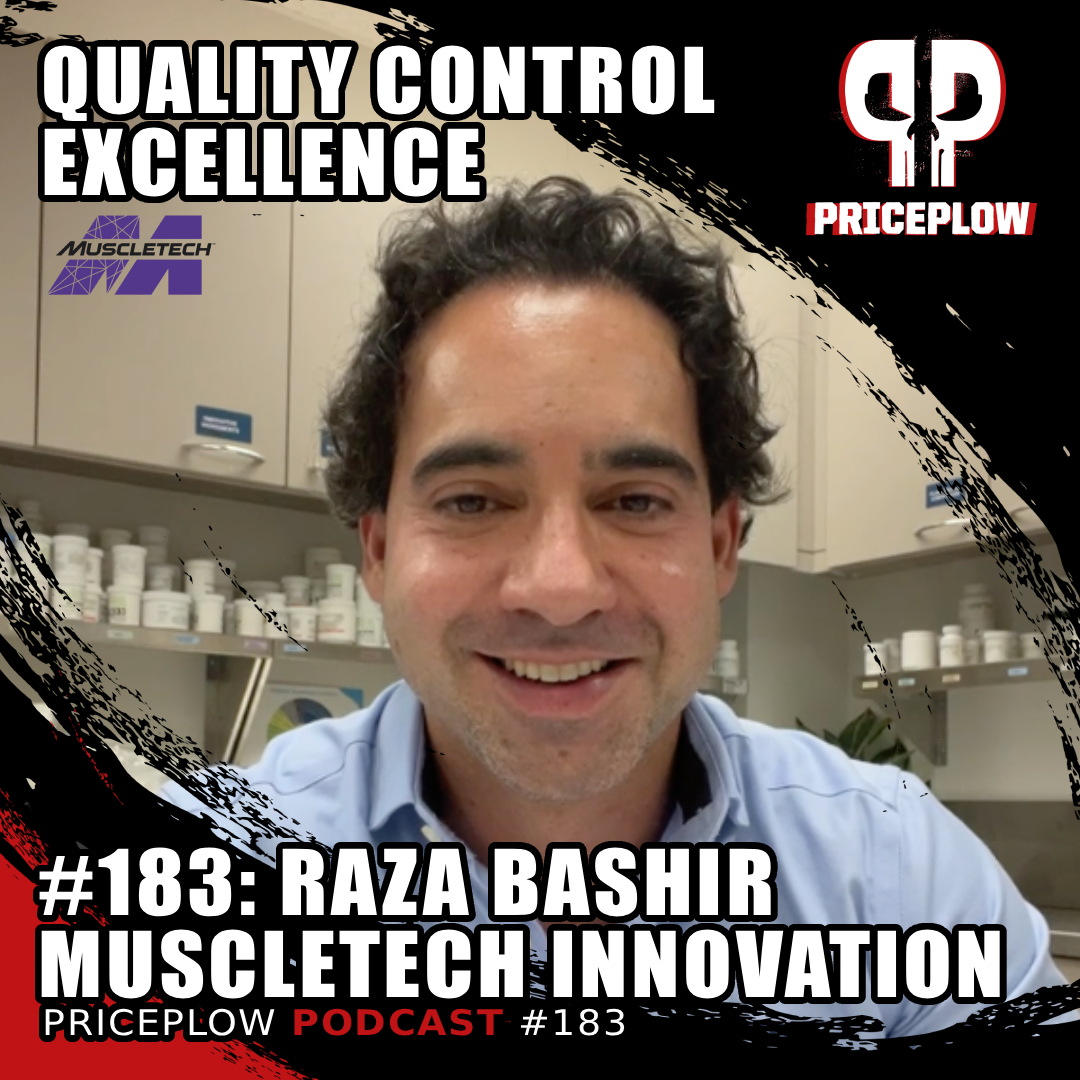
Raza Bashir, Chief Innovation Officer at MuscleTech, reveals unprecedented transparency about quality control systems managing 28+ global manufacturers while previewing revolutionary effervescent technology and peptide innovations on Episode #183 of the PricePlow Podcast.
This conversation goes far beyond typical brand discussions, diving deep into the nuts and bolts of quality assurance: how MuscleTech manages relationships with 28+ contract manufacturers worldwide, the extensive third-party testing protocols that validate every batch, and the end-to-end oversight that distinguishes legacy brands from newcomers. Raza shares insights from recent Consumer Reports testing that validated MuscleTech's mass gainers as the only products without concerning levels of heavy metals, demonstrating how comprehensive quality systems deliver tangible consumer protection.
The discussion then shifts to innovation, with exclusive reveals of breakthrough effervescent technology launching through the EFF'N Series at GNC, new peptide formulations combining cutting-edge ingredients like dileucine with HMB and essential amino acids, and the evolution of stimulant technology through EuphoriQ and the revolutionary Stacked pre-workout featuring Hydronox citrulline hydrochloride. Throughout the conversation, Raza's passion for both scientific rigor and consumer experience shines through, explaining why MuscleTech continues setting industry standards after three decades.
Subscribe to the PricePlow Podcast on Your Favorite Service (RSS)
https://blog.priceplow.com/podcast/muscletech-quality-control-183
Video: Raza Bashir Discusses MuscleTech’s Quality Control and Innovation Pipeline
Podcast: Play in new window | Download (Duration: 1:28:13 — 82.1MB)
Detailed Show Notes: Quality Systems and Innovation at MuscleTech
-
0:00 - Introductions: Inside MuscleTech's Innovation Lab
Ben opens Episode #183 by welcoming Raza Bashir, Chief Innovation Officer at MuscleTech and Iovate, noting the extensive discussions planned around quality control, manufacturing excellence, and the innovation pipeline that's generating unprecedented excitement within the organization. The setting is meaningful -- Raza broadcasts from MuscleTech's actual laboratory facility where formulation development, taste testing, and quality assessment occur daily.
Raza shares his comprehensive role overseeing everything from initial formulations and product development through flavor creation and commercialization strategy. With nearly 20 years of industry experience exclusively at MuscleTech, he brings deep institutional knowledge of what works across diverse global markets. His passion for the supplement industry stems from its unique community of people who started as consumers, became enthusiasts, and evolved into industry professionals... a trajectory Raza himself followed.
The introduction establishes the episode's dual focus: first, pulling back the curtain on quality control processes that most consumers never see, and second, previewing innovations that represent some of Raza's most exciting work in two decades. Mike notes the importance of transparency around quality given MuscleTech's massive scale and distribution, setting the stage for an unprecedented look at how legacy brands maintain standards across global operations.
-
0:45 - Raza's Journey: From Passionate User to Innovation Leader
Ben references the longstanding tradition of meeting Raza at industry conferences like ISSN, where they explore research posters and discuss emerging science together. This highlights Raza's genuine engagement with the scientific community rather than just product marketing. The relationship built over years of these interactions creates the foundation for today's in-depth technical discussion.
Raza reflects on being part of the best industry, emphasizing how most participants share a common origin story: they loved training, understood the importance of proper nutrition and supplementation, and wanted to contribute to helping others achieve their goals. This shared passion creates a unique industry culture where even competitors can collaborate and support each other's success.
The conversation touches on Raza's evolution from formulator to broader innovation leadership, noting how his role now encompasses not just creating formulas but also telling the brand story and building relationships across the industry. This transition required stepping out from behind-the-scenes manufacturing work to become a public face of MuscleTech's scientific approach, a shift he initially resisted but now embraces as essential for effective brand building.
-
4:00 - The Manufacturing Network: Managing 28+ Global Partners
Mike asks about the scale of MuscleTech's contract manufacturing network, and Raza reveals they work with approximately 28 different manufacturers globally -- a number that fluctuates based on product formats, regional requirements, and capacity needs. This extensive network enables MuscleTech to serve 140 countries while maintaining flexibility to respond to supply chain disruptions and demand surges.
MuscleTech EuphoriQ V2 is here! It still has 300mg enfinity paraxanthine, but now supports more citrulline, added betaine nitrate, and a small hit of yohimbe!
The strategy involves maintaining both primary and secondary manufacturers for key products, ensuring service continuity if one partner experiences capacity constraints or quality issues. Raza explains that the number of partners stems from diverse product formats (powders, capsules, tablets, liquids) and the need for specialized capabilities. Some manufacturers excel at specific technologies like protein bar production or effervescent formulations, requiring partnerships with facilities possessing unique equipment and expertise.
Ben notes how impressive this operational complexity is, requiring extensive coordination and quality oversight across dozens of facilities on multiple continents. The discussion reveals that manufacturer selection isn't purely driven by size -- MuscleTech partners with smaller operations if they demonstrate exceptional quality processes and share the vision for excellence. This willingness to grow with quality-focused partners has enabled several manufacturers to scale significantly over the years.
-
6:45 - The Qualification Process: Rigorous Audits Before Production
When Ben asks about new manufacturer onboarding, Raza describes an extensive qualification process involving both virtual and in-person audits conducted by MuscleTech's dedicated quality team. These professionals specialize in auditing and could potentially audit MuscleTech's own operations if needed -- they're trained specifically in identifying quality risks and verifying cGMP (current Good Manufacturing Practice) compliance.
The auditors assess everything from powder containment systems and air quality control to hygiene practices and safety protocols. Raza shares examples of automatic disqualifiers: excessive powder on production lines indicating poor containment, inadequate moisture control that could compromise product stability, or hygiene issues like rodent presence. Even seemingly minor details like wooden pallets in clean rooms raise red flags because wood can harbor pests and contaminants.
MuscleTech sent EuphoriQ V2 pre-workout beta samples to PricePlow Discord insiders, and we record their feedback on the Discord for Episode #159 on our podcast.
Temperature control receives careful scrutiny, as extreme conditions can affect product stability and shelf life. The audit team evaluates whether manufacturers have appropriate environmental controls for both production and storage areas. Mike recalls visiting facilities where powder covered everything, making floors slippery -- a clear sign of inefficient processes and potential cross-contamination risks that MuscleTech would not tolerate.
The qualification process extends beyond initial approval, with ongoing audits ensuring standards remain consistent over time. Raza emphasizes the importance of continuous improvement, noting that good manufacturers respond positively to feedback and implement corrective actions promptly. This partnership approach distinguishes lasting relationships from purely transactional arrangements.
-
10:30 - Ingredient Qualification: Testing Before Approval
Beyond manufacturer audits, MuscleTech implements rigorous ingredient qualification protocols. Raza explains that while they haven't personally traveled to ingredient manufacturing facilities in China and India, they leverage partners to conduct overseas audits and maintain extensive documentation from suppliers. The key is building deep relationships with suppliers who provide complete transparency about their processes and certifications.
Every ingredient undergoes third-party testing before approval for production use, regardless of supplier-provided Certificates of Analysis. When onboarding a new raw material, MuscleTech sends samples to independent laboratories to validate specification claims and ensure the material meets their quality standards. Only after passing this verification does an ingredient receive official approval for incorporation into MuscleTech products.
Ben raises an important point about amino acid sourcing, noting that there's no definitive test to prove whether amino acids are vegan-fermented versus animal-derived. Mike McCann famously argued this point on bodybuilding.com forums in 2017, emphasizing that unless you personally visit Chinese manufacturing facilities, you cannot absolutely verify vegan claims. This underscores the importance of supplier relationships and trust, built through consistent quality delivery over time.
Veteran GNC franchisees Eric Miller, Benny Farzad, and Laura Dalton share frontline retail insights alongside Nutralabz's Ben Benedict, Florida franchisee Mona Bailey, and MuscleTech's Raza Bashir in the finale of our GNC Global Conference coverage on Episode #177 of the PricePlow Podcast.
Raza concurs that deep supplier relationships become essential for ingredients where analytical testing has limitations. The combination of technical documentation review, supplier certifications, third-party testing, and long-term performance tracking creates multiple validation layers that build confidence even when single tests cannot provide absolute certainty.
-
14:00 - The Branded Ingredient Advantage: Established Supply Chains
The conversation shifts to branded ingredients and their quality advantages. Ben notes that brands like Creapure creatine maintain such rigorous specifications -- 99.98% purity in Creapure's case -- that the patent itself enforces quality standards. For companies with robust quality departments like MuscleTech, regularly testing incoming ingredients enables quick rejection of substandard materials, but smaller brands benefit significantly from branded ingredient supply chains with built-in quality assurance.
Raza discusses MuscleTech's approach of sometimes working directly with manufacturers to create custom ingredients rather than using existing branded materials. This allows them to specify precise standardizations based on scientific research that identifies optimal active compound ratios. He provides an example of working with a supplier to create a red spinach extract standardized for specific nitrate levels, used in products like Pumped 8 and later incorporated into Shatter pre-workout formulations.
The custom ingredient development process involves identifying desired bioactive compounds based on research, working with manufacturers to achieve targeted standardization levels, and then conducting efficacy testing to validate the benefits. Raza shares a personal anecdote about testing the red spinach extract and experiencing dramatic endurance improvements despite being naturally more type-II muscle fiber dominant and typically poor at endurance activities.
Viral allegations claimed MuscleTech Nitro-Tech had only 13g protein instead of 30g. Investigation found major red flags -- unauthorized distributor, missing lab docs, likely counterfeit product. Real MuscleTech tested at 36.5-36.8g protein by Eurofins.
Mike notes the impressive scale at which MuscleTech operates, mentioning how the team regularly sends products from international facilities in different flavors and formats that American consumers never see. This global footprint provides unique perspective on regional preferences and quality standards across diverse regulatory environments.
-
17:15 - Production Consistency: Managing Multiple Manufacturers Per Product
Mike asks how MuscleTech ensures consistency when multiple manufacturers produce the same product, especially regarding flavor profiles. Raza explains that they typically assign specific flavors to individual manufacturers based on volume requirements -- for example, high-volume flavors like chocolate and vanilla might require two manufacturers to meet demand, while lower-volume flavors like strawberry can be handled by a single facility.
The key to maintaining consistency lies in MuscleTech controlling the flavoring process in-house. They formulate flavor systems at their laboratory facility, conduct extensive testing and refinement, and then provide the finalized flavor specifications to contract manufacturers. This ensures that regardless of which facility produces a given SKU, the flavor profile remains consistent because they're all following MuscleTech's proprietary flavor formulation.
After manufacturing, MuscleTech's quality team conducts taste assessments on every production lot, comparing samples against their gold standard reference. This lot-to-lot consistency checking happens at their laboratory, where Raza currently broadcasts from. The product development team tastes samples from each batch, ensuring they match the established flavor profile before approving release to distribution.
Grape Gainz flavor for MuscleTech EuphoriQ V2! Experience the clean energy of 300mg enfinity paraxanthine with that perfect grape candy taste. No jitters, no crash - just smooth energy and massive pumps with 6g citrulline.
Raza shares that they've had to make difficult decisions when production lots don't meet the gold standard, rejecting batches that don't match the expected taste profile. These conversations with manufacturers can be challenging, but maintaining consistent consumer experience justifies the tough calls. He emphasizes that consumers notice when products taste different between purchases, and such inconsistency can permanently damage brand loyalty.
-
22:15 - The Multiple Manufacturer Strategy: Service and Supply Chain Resilience
Ben highlights an important business reality that smaller brands often miss: relying on a single contract manufacturer creates significant vulnerability to supply chain disruptions and capacity constraints. He's observed numerous brands publicly commit to specific manufacturers, only to face extended out-of-stock situations six months later when that manufacturer encounters production issues or capacity limitations.
The multiple manufacturer strategy isn't just about capacity -- it's about service reliability and business continuity. When brands can only work with one facility, that facility holds tremendous leverage in the relationship. Conversely, when brands like MuscleTech work with multiple qualified partners, they maintain negotiating power while ensuring product availability even if one partner faces challenges.
Raza acknowledges that working with multiple manufacturers adds complexity compared to single-source relationships, but emphasizes that consumer service must be prioritized. If products aren't in stock, consumers will try alternatives and potentially never return. The investment in managing multiple manufacturer relationships pays dividends through consistent product availability and customer satisfaction.
Traveling with creatine just got easier! MuscleTech's Creatine Chews offer a mess-free, TSA-friendly alternative to powders. Perfect for maintaining your routine on the go!
The discussion reveals sophisticated supply chain thinking that distinguishes established brands from emerging companies. While startup brands might simplify operations by working with fewer partners, scaling requires building redundancy and flexibility into manufacturing networks to support growth without service interruptions.
-
24:15 - Third-Party Testing and Consumer Reports Validation
Mike asks about external testing by organizations like Consumer Reports, noting that MuscleTech's size and retail distribution make them natural candidates for independent quality assessments. Raza shares recent positive news: Consumer Reports tested multiple mass gainer products and found that MuscleTech's offerings were the only ones without concerning levels of lead and cadmium.
This validation wasn't surprising to Raza because MuscleTech maintains rigorous internal testing protocols, but it provides valuable third-party confirmation of their quality systems. The Consumer Reports team reached out for comment, and MuscleTech provided detailed information about their testing procedures and quality control processes. While Raza didn't name which other brands were tested, the implication is clear -- products sold through major retail channels were found wanting in heavy metal testing.
The conversation underscores the importance of having robust data to support quality claims. When independent testing organizations come calling, brands with comprehensive quality programs can confidently provide documentation and detailed explanations of their processes. This transparency builds credibility with both regulatory bodies and consumers.
Ben notes that consumers sometimes doubt legacy brands' commitment to quality, but the reality is that large-scale distribution requires extraordinary attention to compliance. When you're crossing international borders and selling through major retailers, you face far more regulatory oversight and quality scrutiny than brands operating primarily through direct-to-consumer channels.
-
27:00 - Protein Testing and Nitrogen Analysis Methods
Now it's time for MuscleTech's flagship protein, Nitro-Tech, to get some love there. The 1.5 pound Nitro-Tech tubs are now available at Walmart!
The discussion shifts to protein testing methodologies, with Raza explaining MuscleTech's transparent approach to reporting protein content. For Nitro-Tech, their flagship protein product sold in hundreds of countries, they recently published comprehensive third-party test results using multiple analytical methods: Kjeldahl, Dumas, and Leco -- all widely accepted protein evaluation techniques that measure nitrogen retention.
These tests consistently showed NitroTech testing at 35 to 36.5 grams of protein per serving, despite the label claiming 30 grams of protein from whey. The explanation is straightforward: NitroTech contains 3 grams of added creatine monohydrate, which contributes nitrogen that gets captured by these analytical methods. Importantly, MuscleTech only counts the actual whey protein in their protein declaration, not the nitrogen from creatine.
This transparency addresses the amino acid spiking controversy from 2014, when the industry faced scrutiny about adding cheaper nitrogen-containing compounds to inflate apparent protein content. Mike notes his involvement in that discussion through his comprehensive amino acid spiking article that helped define industry standards. The law's ambiguous definition of "protein" based on nitrogen testing created opportunities for unethical practices.
Raza explains that MuscleTech was instrumental in establishing regulatory guidance through the American Herbal Products Association. In 2014, he worked with Dr. Robert Wildman and others on the Protein Working Committee to define protein as peptide-bonded amino acids rather than just nitrogen content. This guidance, supported by multiple trade organizations including CRN (the Council for Responsible Nutrition), established industry standards that reputable companies follow.
-
32:00 - The Creatine Conundrum: Testing Above Label Claim
Mike clarifies the creatine molecule contains three nitrogen atoms, providing approximately 10-11% of creatine's molecular weight. This means creatine can significantly inflate nitrogen-based protein tests, creating potential for gaming the system if companies aren't transparent about formulations. For NitroTech, MuscleTech wants consumers to receive both 30 grams of actual whey protein AND 3 grams of creatine, with nitrogen tests confirming this by exceeding 30 grams due to creatine's nitrogen contribution.
MuscleTech Plant Protein packs a powerful punch of complete plant-based protein to fuel your workouts and recovery.
The conversation touches on testing mass gainers, which becomes even more complex because these products typically contain multiple carbohydrate sources, fats, and other nitrogen-containing compounds. Comprehensive amino acid analysis provides the most accurate protein assessment but costs significantly more than simple nitrogen testing, making it prohibitively expensive for routine quality control.
Ben raises an important consumer education point: anytime someone sees added amino acids in a protein product, they often assume "amino spiking" even when the additions serve legitimate purposes. Ingredients like taurine and glycine offer genuine benefits but became controversial during the spiking era. Raza and Mike both express regret about how that controversy affected consumer perception of beneficial ingredients.
Mike acknowledges that the aggressive messaging against amino spiking may have gone too far, making consumers suspicious of any amino acid additions even when appropriately disclosed. Looking back, glycine and taurine are excellent ingredients that many people don't consume enough of through diet alone. Bundling them in protein powders would be convenient, but the education got away from the industry for a period.
-
36:30 - The Transparency Advantage: Avoiding Proprietary Blends
Raza emphasizes that avoiding proprietary blends significantly enhances consumer confidence in protein products. Full disclosure of protein sources and amino acid additions allows consumers to make informed decisions and understand exactly what they're purchasing. Combined with third-party testing documentation, this transparency approach eliminates ambiguity about protein quality and content.
Ben discusses how the amino acid spiking controversy ultimately ushered in an era of transparency and consumer education. He references a podcast with James Vecuzzi discussing "the mystery of proprietary blends" and how, in earlier eras, that mystery created excitement. Consumers didn't have armies of "PubMed warriors" analyzing every ingredient, so discovering what was in formulas felt like an adventure.
MuscleTech Alpha Test Extreme is a powerful testosterone booster packed with clinically proven ingredients to naturally enhance testosterone production. It has a 200mg dose of Tesnor, which has been shown to boost free testosterone levels by 13.74%, targeting what matters most.
The comparison to older MuscleTech products illustrates this evolution -- early formulations often featured extensive proprietary blends that created intrigue and allowed for competitive secrecy. Times have changed dramatically, with modern consumers demanding complete transparency and understanding of ingredient dosages. This shift reflects broader social media education and information accessibility that has transformed supplement shopping from faith-based purchases to informed decisions.
Raza shares an interesting historical note: MuscleTech actually pioneered full transparency back in 2010 with their "super concentrated series" including Neurocore, Nano Vapor, AlphaTest, and Hydroxycut Hardcore Elite. The marketing positioned this as "I want the truth" for consumers, fully disclosing ingredients like citrulline, beta-alanine, and other actives at a time when proprietary blends dominated the market.
-
39:00 - Innovation Without Over-Engineering
The conversation shifts to MuscleTech's formulation philosophy, with Raza explaining how they focus on science-backed ingredients rather than creating "kitchen sink" formulas packed with dozens of compounds. The transparency movement allowed them to showcase efficacious dosing of proven ingredients while avoiding the temptation to include everything possible just for label appeal.
Ben notes that modern MuscleTech products like Peptide 185 (the first dileucine product) maintain full transparency with clear dosage information, representing a continuation of the company's evolution toward openness. This builds trust while allowing consumers to understand what they're taking and why each ingredient is included.
Each 3-capsule serving of MuscleTech Peptide 185 has 2 grams of dileucine!
The formulation approach balances cutting-edge innovation with practical efficacy, ensuring products deliver results without unnecessary complexity. Raza's passion for novel ingredients and delivery technologies comes through clearly, but always anchored in scientific justification rather than marketing hype.
-
40:15 - Business Resilience and Continued Innovation
Mike addresses the business transition MuscleTech has been managing, noting questions in the community about the company's future. The evidence of continued innovation -- new products appearing on retail websites, active trade show participation, and this very podcast -- demonstrates that MuscleTech remains fully operational and committed to moving forward.
Raza confirms that after 30 years, MuscleTech isn't going anywhere. The company is working through some legacy banking matters but remains completely committed to customers, consumers, suppliers, and business partners. Looking ahead, MuscleTech is emerging as a leaner, more agile business intensely focused on innovation and execution.
The team will maintain full presence at major industry events including Olympia, Dubai Muscle Show, and Supply Side West, showcasing new innovations and meeting with partners. This consistent engagement with the industry and supply chain demonstrates business continuity and forward momentum rather than retreat or consolidation.
Raza emphasizes that innovation remains just as important now as ever, with plans to continue bringing breakthrough ingredients and technologies to market. The excitement in his voice suggests this isn't just corporate messaging but genuine enthusiasm for upcoming product launches that represent some of his most innovative work in two decades.
-
43:30 - The Innovation Risk: Pioneering New Ingredients
Mike notes that when companies face restructuring, the typical approach is to lean on legacy products while cutting innovation budgets to preserve cash. MuscleTech's continued investment in novel ingredients like paraxanthine through EuphoriQ demonstrates a different strategy -- maintaining innovation even during transition periods.
Raza reflects on EuphoriQ as a proud achievement, representing something completely differentiated from all other caffeinated pre-workouts on the market. They were attempting something genuinely different, which always carries risk when targeting a more niche early-adopter audience rather than mainstream markets.
The innovation curve means breakthrough products initially appeal to innovators and early adopters before eventually scaling to broader markets. EuphoriQ targeted consumers excited about trying novel stimulant technology, those seeking caffeine alternatives, or people training late at night who wanted stimulation without sleep disruption. The product has performed well and gained increasing distribution beyond initial channels.
Consumer feedback revealed interesting usage patterns -- people who train late appreciate paraxanthine's shorter half-life, allowing them to use it at 5-6pm without affecting sleep. Others noticed the enhanced focus and "dialed-in" feeling compared to traditional caffeine. The education challenge involves helping consumers understand these benefits compared to familiar caffeine experiences.
-
47:00 - EuphoriQ Evolution: Responding to Consumer Feedback
Ben discusses the evolution from EuphoriQ V1 to V2, noting his personal preference for the updated formula. The V2 version incorporated consumer feedback while refining the experience based on real-world usage. Even variations like the Boogieman Walmart exclusive demonstrated MuscleTech's willingness to iterate and adapt formulations.
MuscleTech EuphoriQ's Boogieman Punch FDM Version flavor is now available at Walmart! Comes with a 16g scoop, featuring a few formula tweaks, including a touch of yohimbe.
The challenge Raza identifies is that with as many impressions as MuscleTech receives, it's nearly impossible to satisfy everyone's preferences. Before this conversation, Mike mentioned preferring super-concentrated pre-workouts for cardio, while others love high-volume pump formulas. The diversity of pre-workout preferences among even educated consumers is remarkable.
Ben emphasizes this point through his content creation experience -- hitting millions of impressions reveals just how many different types of pre-workouts people want. Some prefer high stimulants, others want pump focus, some need nootropics, others seek endurance support. Creating a single product that satisfies all these preferences is practically impossible.
The solution involves offering diverse product lines serving different needs while maintaining clear positioning for each formula. MuscleTech's portfolio approach allows them to serve multiple consumer segments without trying to force one product to be everything to everyone.
-
52:00 - The Leaner Business Philosophy: Focused Excellence
When Ben asks about the "leaner" business approach Raza mentioned, the response focuses on discipline and execution rather than cutting product lines or abandoning innovation. Being leaner means more focused resource allocation, ensuring proper support and education accompany product launches rather than spreading efforts too thin.
Raza emphasizes that lean doesn't mean abandoning legacy products or innovation, it means being really focused on excellence and execution. When launching something new, ensuring the support infrastructure, education materials, and marketing are properly developed rather than rushing to market without adequate preparation.
Ben appreciates this answer because it addresses a common concern when legacy brands grow large -- will they still create products for hyper-educated enthusiasts, or only chase mainstream consumers? MuscleTech's continued development of innovative products like EuphoriQ demonstrates commitment to serving the knowledgeable consumer segment that drives word-of-mouth and social media buzz.
The ability to excite hardcore supplement enthusiasts while maintaining broad retail distribution is rare among legacy brands. Many companies reach a point where they only focus on mass-market appeal, but MuscleTech's strategy involves serving both audiences through thoughtful product development and clear positioning.
-
55:00 - The EFF'N Series: Revolutionary Effervescent Technology
Mike introduces MuscleTech's breakthrough EFF'N Series, noting products that have just appeared on GNC.com as exclusively teased in previous podcast episodes. The line includes EFF'N Energy!, EFF'N Hydrate!, and EFF'N Cut!, each featuring proprietary effervescent bead technology that creates a unique consumption experience.
Raza explains the concept began with developing effervescent beads that dissolve in liquid while creating a bubbly, carbonated beverage experience. They embraced this technology and created the "EFF'N" name -- short for effervescent but with an edgy, bold attitude. The innovation targets categories where more enjoyable consumption formats could enhance the user experience.
EFF'N Hydrate combines electrolytes with Senactiv for enhanced endurance and performance, providing both immediate hydration benefits and exercise support. EFF'N Cut focuses on metabolism enhancement and fat loss, featuring Theolim -- a novel ingredient derived from cacao and lime citrus peel -- alongside acetyl-L-tyrosine, 200mg caffeine, and chromium picolinate.
Mike notes interest in Theolim, the lime peel citrus extract, which hasn't been widely discussed in the supplement community. Most citrus peel extracts discussed are orange or lemon-based, making this lime-derived ingredient novel and intriguing.
-
59:00 - Theolim: Novel Metabolism Enhancement
Raza explains that Theolim is a first-to-market innovation that's been in MuscleTech's development pipeline for several years. The ingredient derives from cacao and key lime citrus peel, featuring impressive human clinical data including two studies demonstrating its ability to burn calories with and without training -- an unusual and valuable characteristic.
The research shows Theolim can help users burn three times more calories compared to baseline, with documented weight loss effects and interesting preliminary data suggesting it may enhance natural GLP-1 production within the body. This positions it within the broader conversation about GLP-1 agonists and metabolic health without requiring pharmaceutical interventions.
Ben asks about the regulatory considerations around claiming GLP-1 production enhancement, noting the sensitivity around this topic. Raza acknowledges the challenge, explaining that GLP-1 was never "sexy" to discuss before pharmaceutical GLP-1 agonists became popular. The industry has always studied hunger hormones -- GLP-1, ghrelin, leptin -- but consumers didn't care about mechanisms, only results.
The drug class has changed that dynamic, making consumers more aware of GLP-1's role in appetite regulation. However, Raza emphasizes they're not comparing Theolim to pharmaceutical interventions or claiming similar magnitude effects. The natural ingredient may support endogenous GLP-1 production without the downsides of medications that essentially tell your body to stop eating and slow gut motility.
-
1:04:00 - EFF'N Energy: Genius Pure and Yohimbe
Mike reviews the EFF'N Energy formula, noting 200mg choline, 500mg N-acetyl-L-tyrosine, 2 grams taurine, and 225mg caffeine anhydrous. The standout ingredient is 200mg of Genius Pure from NNB Nutrition, paired with 10mg yohimbe bark extract standardized to 6% yohimbine.
The formula delivers a well-rounded energy experience similar to what MuscleTech achieved with EuphoriQ V2, where adding yohimbe provided extra "kick" to complement the clean paraxanthine energy. Raza notes the acetylated tyrosine works better in effervescent formats, contributing to the overall effectiveness.
The serving format comes in individual sachets containing effervescent beadlets that can be mixed in water or consumed directly. Raza demonstrates opening a packet and showing the beads, which are small enough to consume neat but large enough to create satisfying effervescence when dissolved. The Blue Raz Fizz flavor combines blue raspberry with subtle lemon notes for a popsicle-like taste experience.
-
1:06:00 - The Effervescent Experience: Dissolution and Consumption
Mike asks about dissolution time, and Raza explains the beadlets take approximately 60-80 seconds to fully dissolve depending on the specific formulation. Users can start drinking before complete dissolution if they don't mind slightly more concentrated final sips, but waiting ensures even flavor distribution throughout the beverage.
The technology involves sodium bicarbonate creating foaming action, which means directly consuming the beadlets produces some foaming in the mouth and throat. While safer than dry scooping traditional pre-workouts, Raza recommends mixing in water for optimal experience. If someone does consume directly, they should probably split the serving into two doses with water between.
Ben appreciates the convenience factor for Americans who often resist mixing supplements. The sachet format appeals to consumers who prefer ready-to-drink beverages over powder mixing, similar to how energy drinks became more popular than pre-workout powders for many users. The portability and no-mess consumption addresses a genuine market need.
Raza notes the complete absence of residue compared to powder mixing -- no leftover clumps in shakers, no powder spills on countertops. The beadlets provide a cleaner overall experience that resonates with consumers seeking convenience alongside efficacy.
-
1:09:00 - Marketing and Product Positioning: "Welcome to the EFF'N Future"
Mike reads the packaging tagline: "Welcome to the EFF'N Future", appreciating the bold positioning and fun approach to innovation. Raza explains they had tremendous fun developing this line, leaning into the edgy branding while delivering serious nutritional technology. The novel delivery format represents genuine innovation rather than incremental improvements.
The conversation touches on cultural differences in effervescent supplement consumption, with Ben noting that Europeans embrace effervescent formats far more than Americans. For unknown reasons, effervescent supplements are massive in Europe but haven't gained similar traction in American markets. The EFF'N Series is MuscleTech's bet that American consumers are ready for this format innovation.
Raza sees consumer convenience as the key driver for potential American adoption. The combination of portability, no-mess preparation, and unique consumption experience may overcome whatever cultural barriers have limited effervescent supplement popularity in the U.S. market previously.
-
1:11:00 - The Peptide Series: Stacking Strategies for Muscle Building
Mike shifts to MuscleTech's Peptide Series, noting the three main products currently available: Peptide 185 (featuring dileucine), Creatine Peptide 447, and Recovery Peptide 144. Previous podcast episodes with Raza and Shawn Wells explored Peptide 185 in depth, explaining how dileucine provides superior muscle protein synthesis signaling compared to regular leucine.
Raza outlines the strategic thinking behind these three products, each targeting different aspects of muscle building and recovery. Peptide 185 activates the anabolic mTORC1 pathway, triggering muscle protein synthesis and increasing strength and muscle growth. Creatine Peptide 447 focuses on ATP production and power output while improving creatine absorption and solubility through bonding with whey peptides.
MuscleTech Peptide Series uses targeted peptide technology instead of basic amino acids for 70-80% better absorption. Muscle Peptide 185 (dileucine) delivers 159% greater muscle protein synthesis vs baseline. Plus Creatine Peptide 447 & Recovery Peptide 144!
Peptide 185 was discussed in Episode #123: Dileucine in MuscleTech Peptide 185 with Raza and Shawn Wells.
Recovery Peptide 144 combines PeptiStrong (the AI-discovered fava bean peptide) with HMB (beta-hydroxy beta-methylbutyrate) to prevent muscle breakdown and accelerate recovery. Raza explains this combination showed synergistic effects in research, with the AI-identified peptide sequence from fava bean providing unprecedented results when combined with HMB.
The stack concept involves turning on anabolic signaling (Peptide 185), preventing catabolism (Recovery Peptide 144), and enhancing ATP production (Creatine Peptide 447). This comprehensive approach addresses all aspects of muscle building and recovery, creating an "ultimate stack" for serious athletes.
-
1:16:00 - Unprecedented Muscle Protein Synthesis Results
Raza shares exciting research data showing the combination of dileucine with essential amino acids produced muscle protein synthesis rates more than seven times higher than BCAAs or leucine alone. This brings enhancement of the body's ability to build muscle in response to training stimulus.
The implications extend beyond professional athletes to anyone seeking to maximize training responses or overcome plateaus. By amplifying the anabolic signal and preventing breakdown while supporting energy production, the stack helps users extract maximum benefit from each workout.
Mike recalls first learning about dileucine from Dr. Ralf Jaeger in Episode #078, where Ralf explained that the body actually "goes out of its way" to form dileucine from consumed protein. Since biological systems are typically "lazy" and avoid unnecessary work, this preferential dileucine formation suggests profound biological importance that researchers are only beginning to understand.
MuscleTech Recovery Peptide 144 features PeptiStrong™ peptides that boost strength recovery by 144% and cut muscle fatigue by 47%. Plus myHMB® for anti-catabolic support and myostatin suppression. Complete your peptide stack!
The regulatory status of dileucine as an amino acid rather than a novel compound simplifies market introduction while providing consumers with a thoroughly researched ingredient. Shawn Wells and the team ensured 100% compliance and safety for use across food and beverage applications globally.
-
1:25:00 - Plasma Protein Technology: Enhanced Bioavailability
Raza introduces MuscleTech's Plasma Whey protein and Plasma BCAA products, explaining how this is their most expensive approach to protein formulation but offers significant bioavailability advantages. The plasma protein technology provides more than 100% increased bioavailability compared to standard whey protein, while plasma BCAAs show 2x greater bioavailability.
This enhanced absorption matters tremendously for maximizing amino acid availability for muscle protein synthesis. Raza explains that previous thinking suggested a "cap" on protein absorption, but modern research shows there's no upper limit -- you simply absorb protein more slowly with larger servings. Enhanced bioavailability technology helps maximize uptake efficiency regardless of serving size.
The innovation shows thoughtful formulation rather than just combining trending ingredients. By improving how efficiently the body absorbs and utilizes protein and amino acids, Plasma technology addresses a fundamental factor in training response and recovery that ingredient selection alone cannot optimize.
-
1:29:00 - Business Continuity and Innovation Commitment
MuscleTech Creatine Peptide 447 combines 6g total creatine (monohydrate + peptide technology) with L-tyrosine and L-theanine for muscle performance and cognitive support. A complete daily performance enhancer beyond traditional creatine.
Returning briefly to business matters, Mike notes that brands in genuine trouble don't continue launching innovative products with novel ingredients. The pipeline Raza has described -- effervescent technology, peptide formulations, plasma protein systems -- demonstrates significant ongoing investment in research and development.
Raza reiterates that MuscleTech is addressing legacy banking issues but remains completely committed to innovation and growth. The company has been around for 30 years and will continue forward, emerging from this transition period with renewed focus on bringing cutting-edge supplements to market.
The emphasis on "leaner and more agile" reflects strategic discipline rather than retreat. By focusing resources on innovation that genuinely advances the category while maintaining rigorous quality standards, MuscleTech positions itself for continued leadership in an increasingly competitive and sophisticated market.
-
1:32:00 - Stacked Pre-Workout: Hydronox Citrulline Hydrochloride
Mike asks about MuscleTech's Stacked Pre-Workout, which Ben has praised extensively. Raza explains the formulation philosophy centered on Hydronox -- a hydrochloride form of citrulline that demonstrates significantly faster conversion to arginine compared to standard citrulline at higher dosages.
The clinical research shows 2 grams of Hydronox citrulline hydrochloride outperforms 6 grams of standard citrulline in terms of arginine production, citrulline-arginine ratio optimization, and nitric oxide markers. This brings a concentration advantage that allows effective pumps without requiring massive serving sizes.
MuscleTech Stacked Pre brings maximum intensity with 300mg caffeine, breakthrough HydroNOx™ citrulline that delivers 2.9x better results than standard L-citrulline, plus yohimbe extract. For serious lifters who want raw power and peak performance.
Stacked also includes betaine nitrate to activate both nitric oxide pathways -- the citrulline-arginine pathway and the dietary nitrate pathway -- for comprehensive pump and blood flow support. Raza explains this wasn't about just adding more citrulline but rather asking what's new in pump technology that can deliver better results through novel mechanisms.
Ben emphasizes that Stacked has been universally well-received among educated consumers, which is rare for pre-workout formulas. The combination of effective pump ingredients, clean stimulation, and thoughtful formulation creates a product that works across different training styles and consumer preferences.
-
1:36:00 - The Innovation Pipeline: Peptides and Beyond
Raza teases upcoming innovation that has him more excited than at any point in his 17-year MuscleTech career. The pipeline includes innovations in supplement forms, ingredient efficacy, and speed of action across multiple categories. He specifically mentions two additional peptide products launching later in 2025, targeting body composition and recovery from different angles.
The scope encompasses blood flow enhancement, accelerated muscle recovery, and strength improvements -- essentially covering every need state that athletes and active individuals face. Raza emphasizes that MuscleTech is innovating across their entire product portfolio rather than focusing on single categories.
The mention of "speed of efficacy" suggests innovations in delivery technology, bioavailability enhancement, or ingredient selection that provides faster onset of benefits. Combined with the peptide references, this points toward sophisticated bioactive compounds that work through novel mechanisms compared to traditional supplements.
Raza Bashir of MuscleTech and Shawn Wells of Ingenious Ingredients join the PricePlow Podcast for Episode #123 to discuss the new dileucine ingredient in Peptide 185!
Mike notes that discussing innovation during business transition demonstrates confidence and commitment. Brands cutting R&D budgets don't develop novel effervescent technology, discover new peptide applications, or invest in plasma protein systems. The innovation pipeline validates MuscleTech's continued market leadership and scientific rigor.
-
1:40:00 - Collaboration and Industry Community
The episode concludes with reflection on industry collaboration and the community-over-competition mentality that defines modern supplement business. Raza's willingness to discuss innovations transparently, his participation in industry events, and his genuine relationships across competing brands exemplify the collaborative approach that benefits everyone.
Ben emphasizes appreciation for the trust MuscleTech places in PricePlow to tell their story accurately and comprehensively. The willingness to provide unprecedented transparency around quality control processes and detailed innovation previews reflects confidence in both their systems and the value of open communication with educated consumers.
Mike notes how these relationships extend beyond transactional business arrangements to genuine friendships built over years of industry participation. Raza's personal friendship with many in the community, combined with his professional expertise, creates unique value for listeners seeking to understand both the science and business of supplements.
The conversation captures why the supplement industry thrives despite intense competition -- authentic relationships, shared passion for helping people achieve their goals, and commitment to advancing the category through innovation create an ecosystem where multiple brands can succeed simultaneously.
Where to Follow MuscleTech and Raza Bashir
- Raza Bashir: LinkedIn
- MuscleTech:
- Sign up for MuscleTech news alerts on PricePlow
- @MuscleTech on Instagram
- MuscleTech.com
EFF'N Series Products:
Peptide Series:
- MuscleTech Peptide Series Overview
- Peptide 185 (Dileucine)
- Creatine Peptide 447
- Recovery Peptide 144
Other Key Products:
Previous Episodes with Raza:
- Raza Bashir & Shawn Wells: MuscleTech enfinity Paraxanthine Launch | Episode #072
- Raza Bashir & Shawn Wells #2: Dileucine in MuscleTech Peptide 185 | Episode #123
Thank you to Raza for providing unprecedented transparency into MuscleTech's quality control systems and for previewing innovations that offer some of the most exciting developments in the supplement industry. The combination of rigorous quality standards and cutting-edge innovation demonstrates why MuscleTech continues leading after three decades.
Subscribe to the PricePlow Podcast for more in-depth conversations with industry leaders and innovators!
Subscribe to the PricePlow Podcast on Your Favorite Service (RSS)
MuscleTech – Deals and Price Drop Alerts
Get Price Alerts
No spam, no scams.
Disclosure: PricePlow relies on pricing from stores with which we have a business relationship. We work hard to keep pricing current, but you may find a better offer.
Posts are sponsored in part by the retailers and/or brands listed on this page.



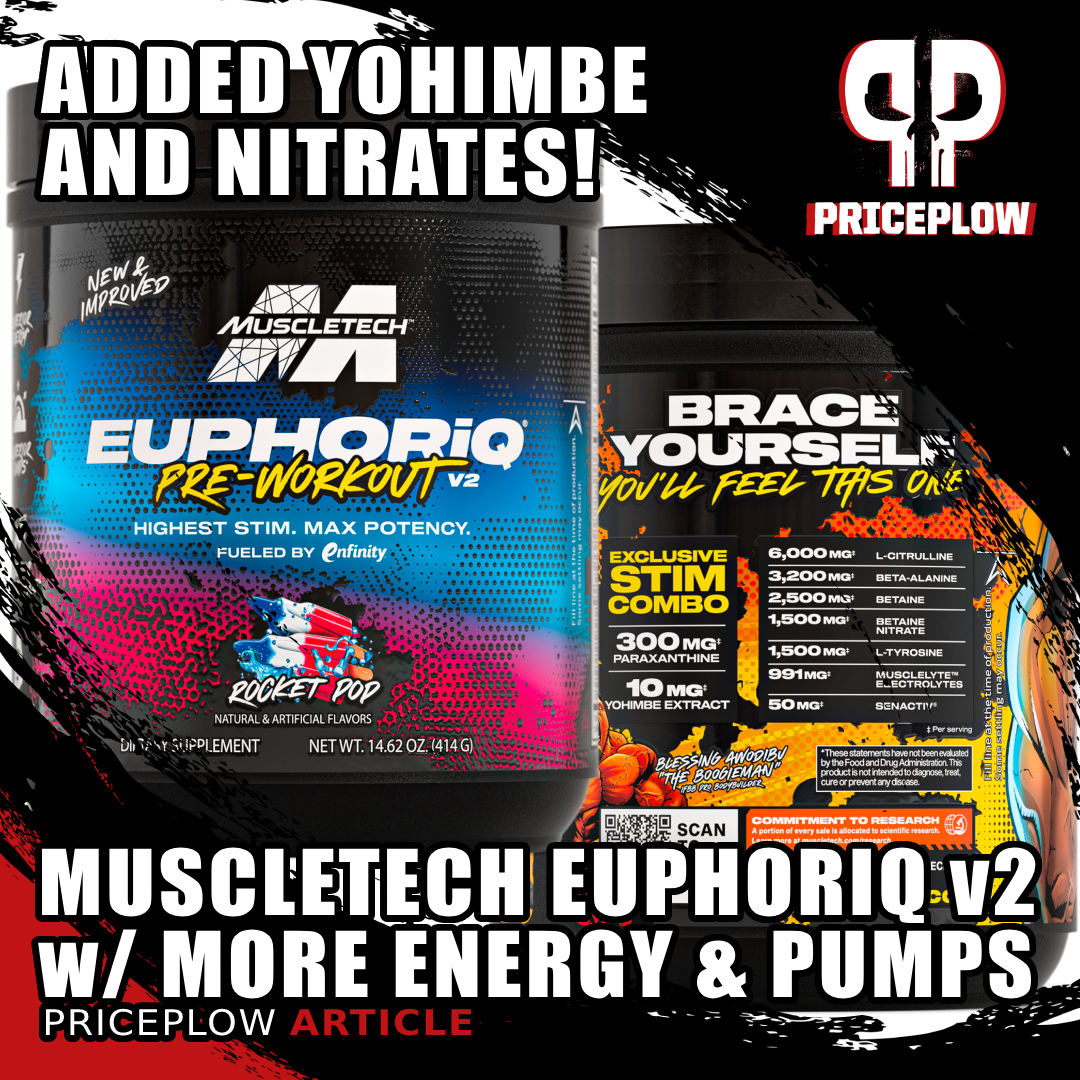
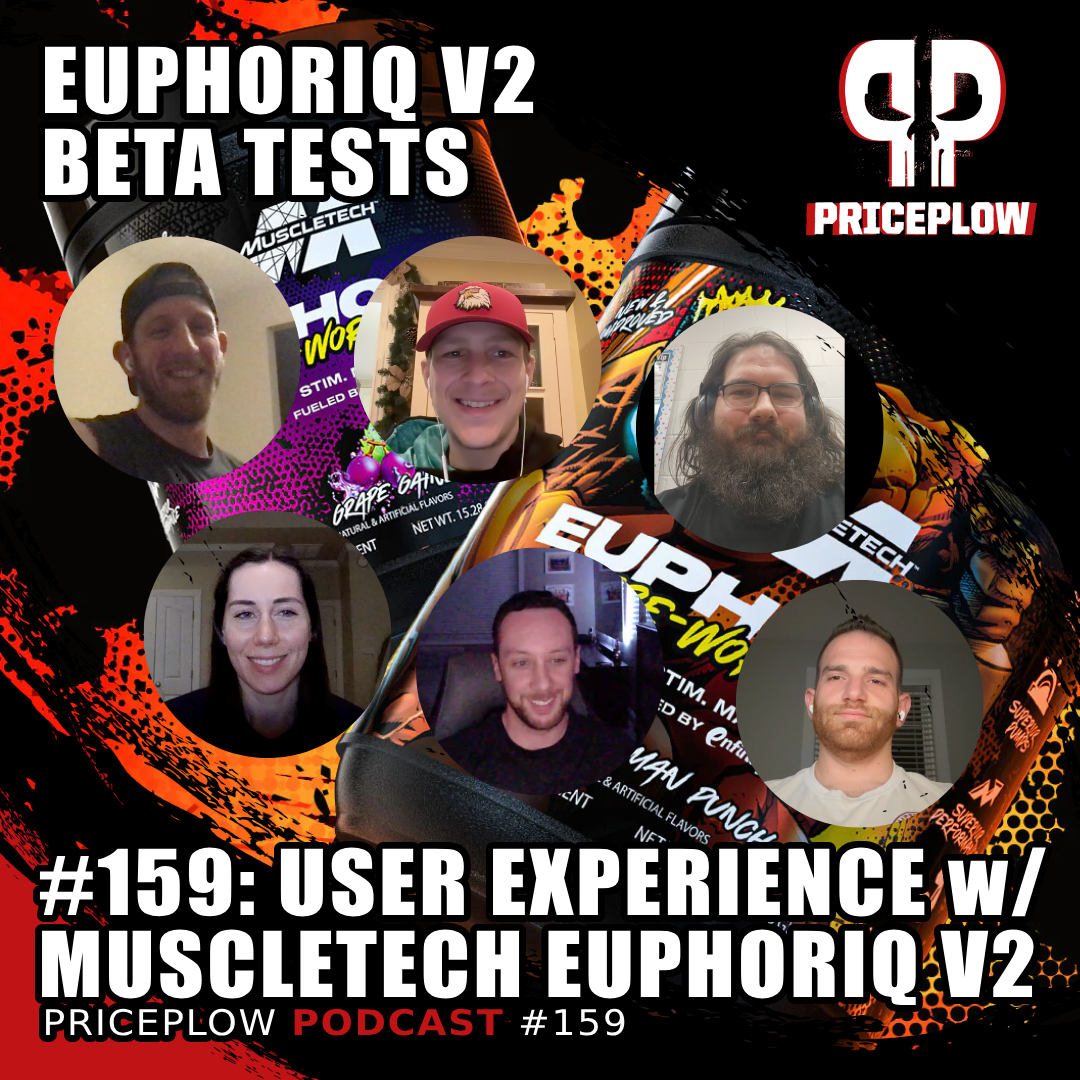
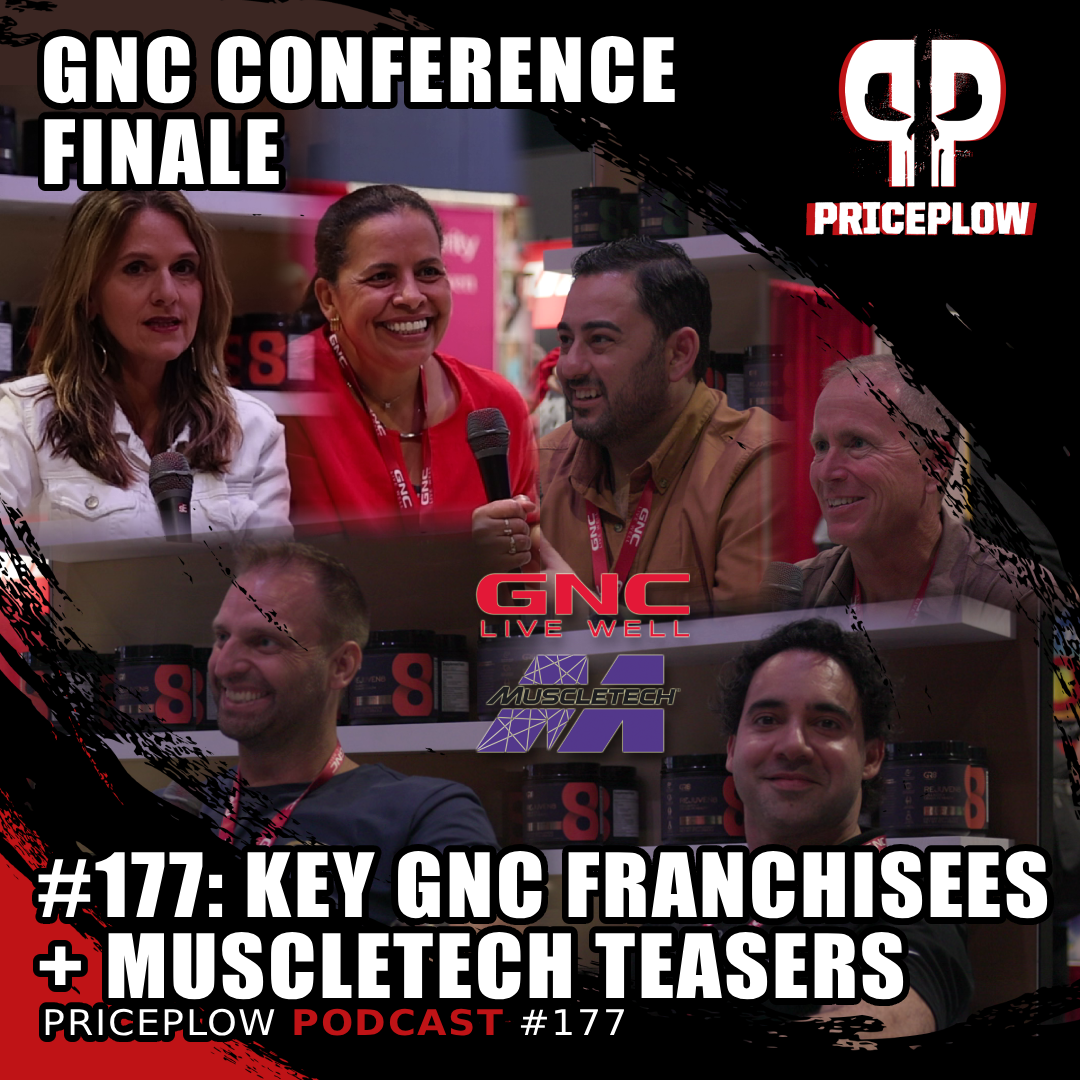
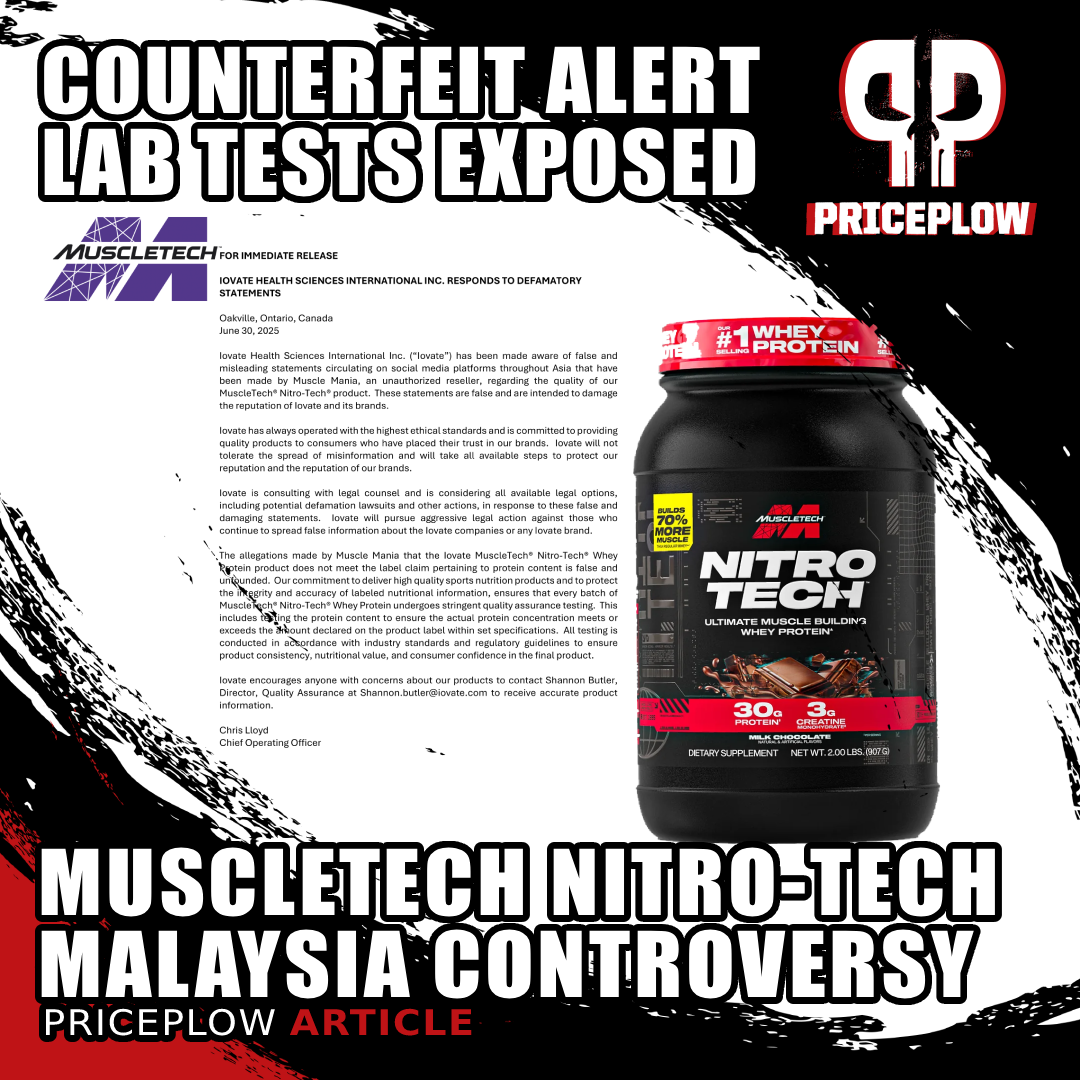
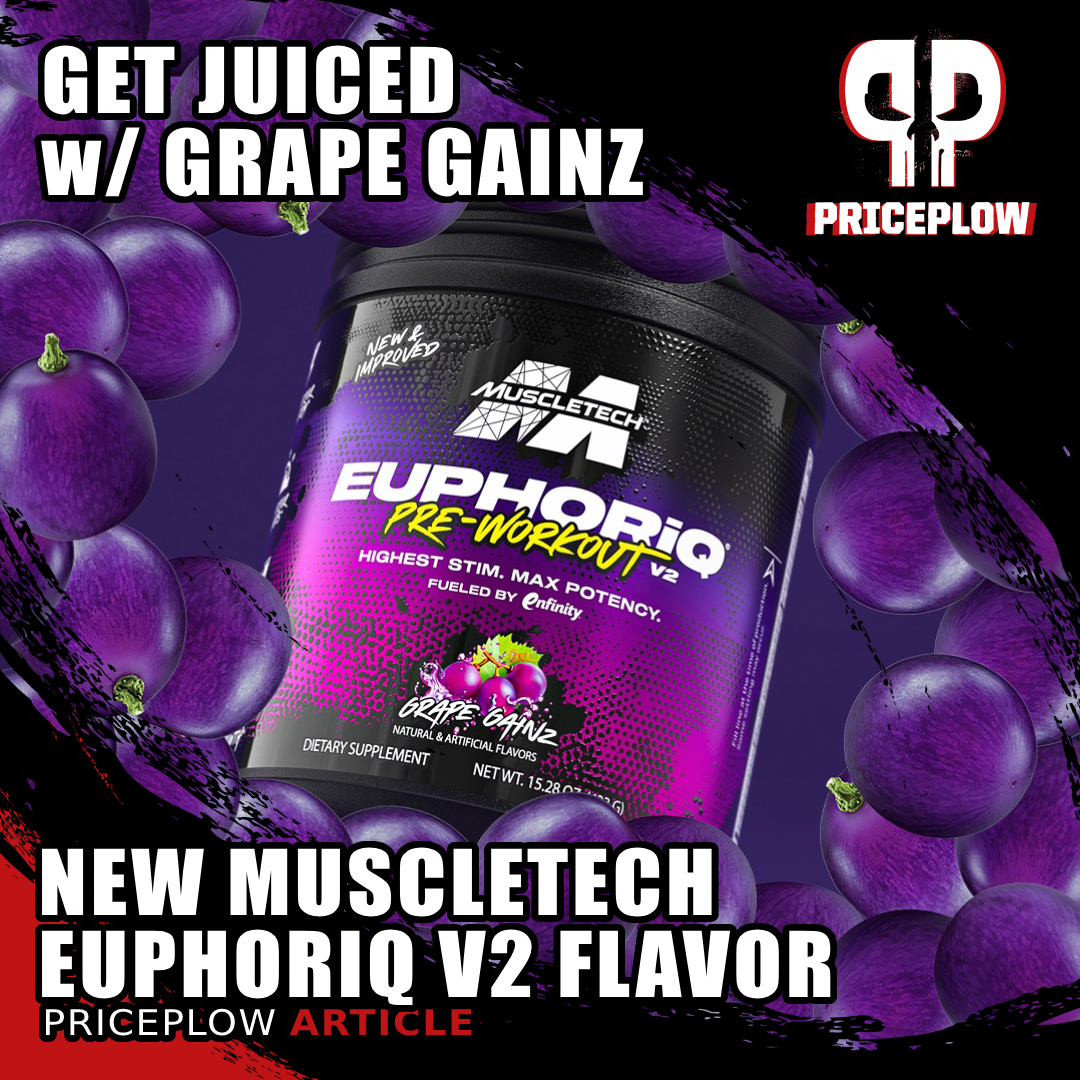
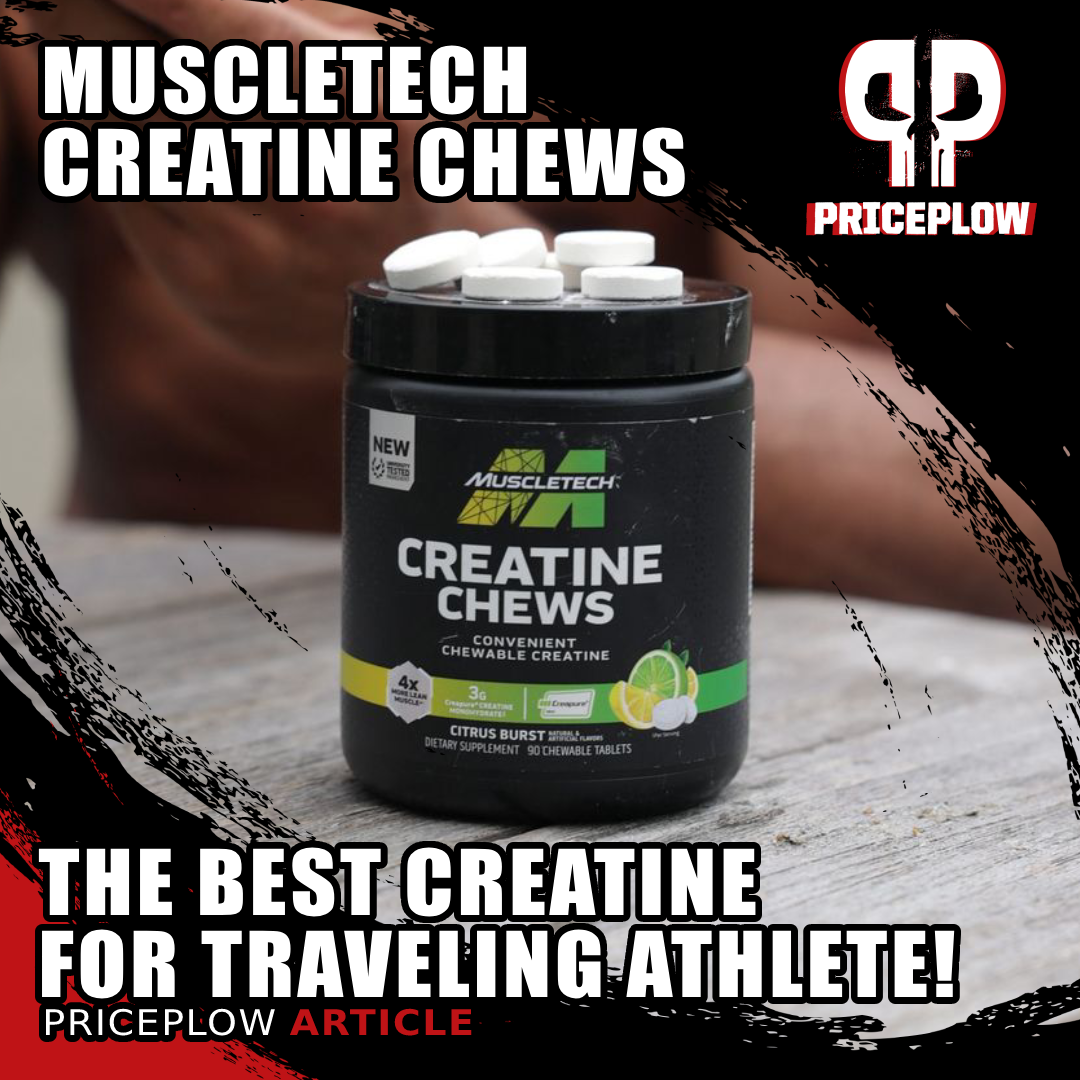
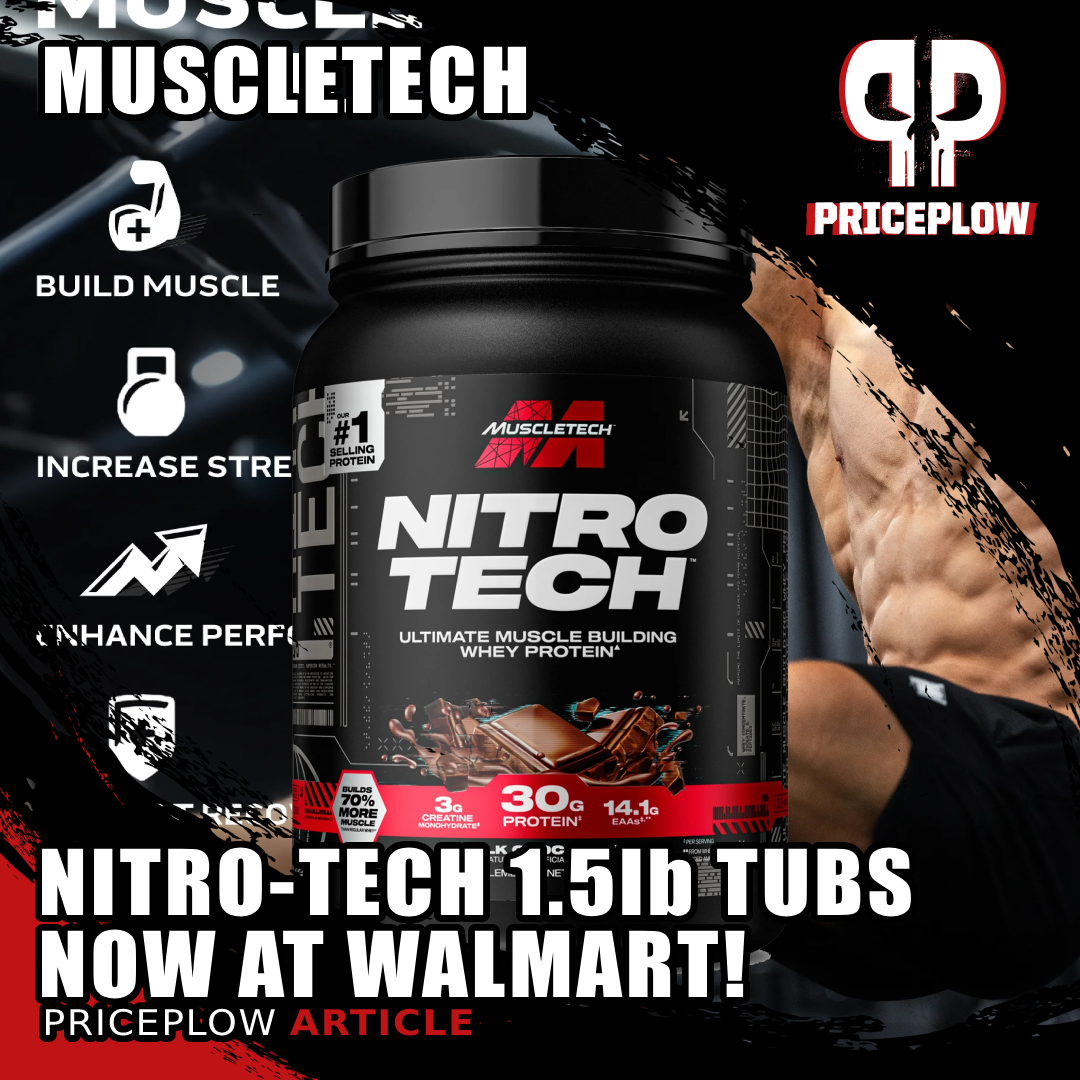

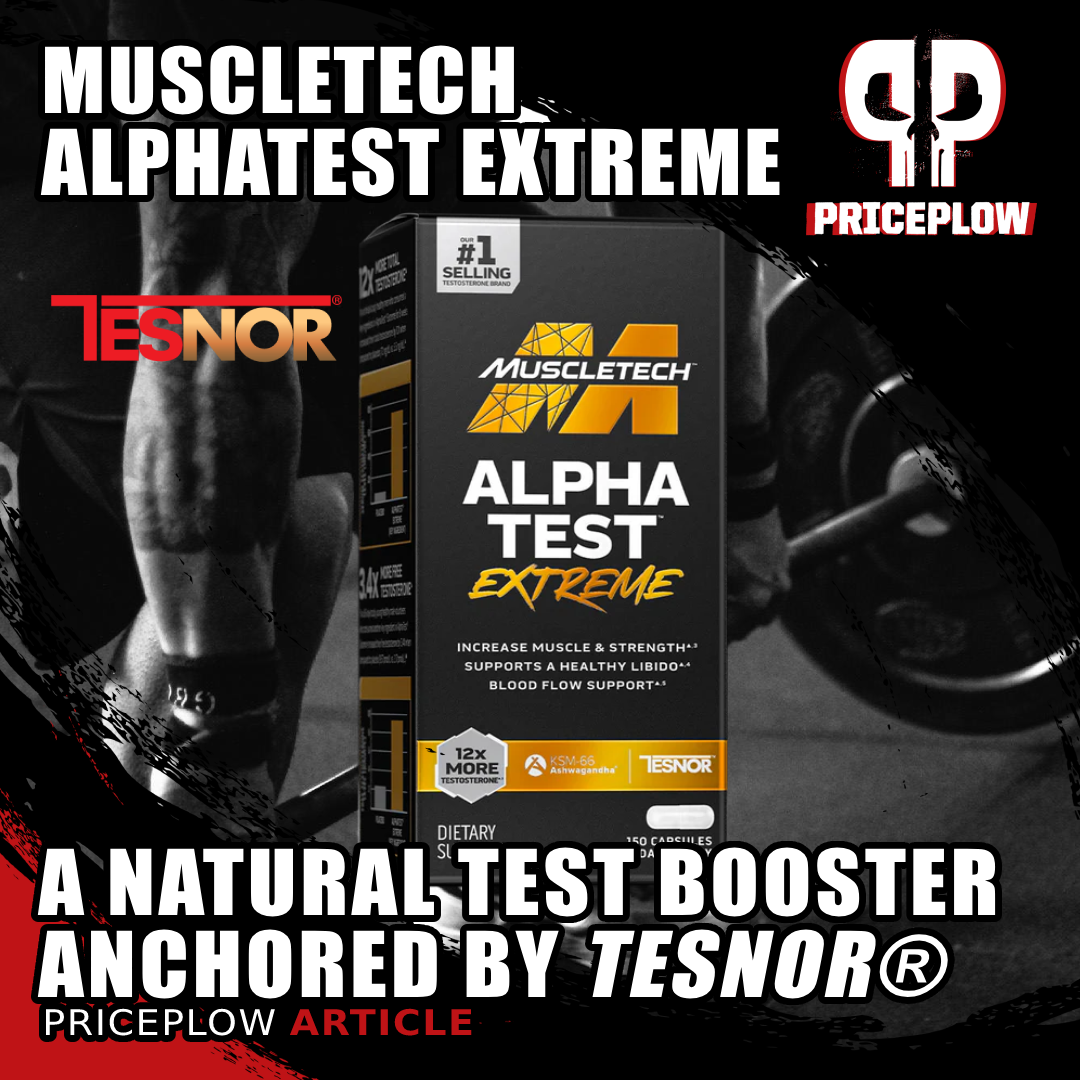
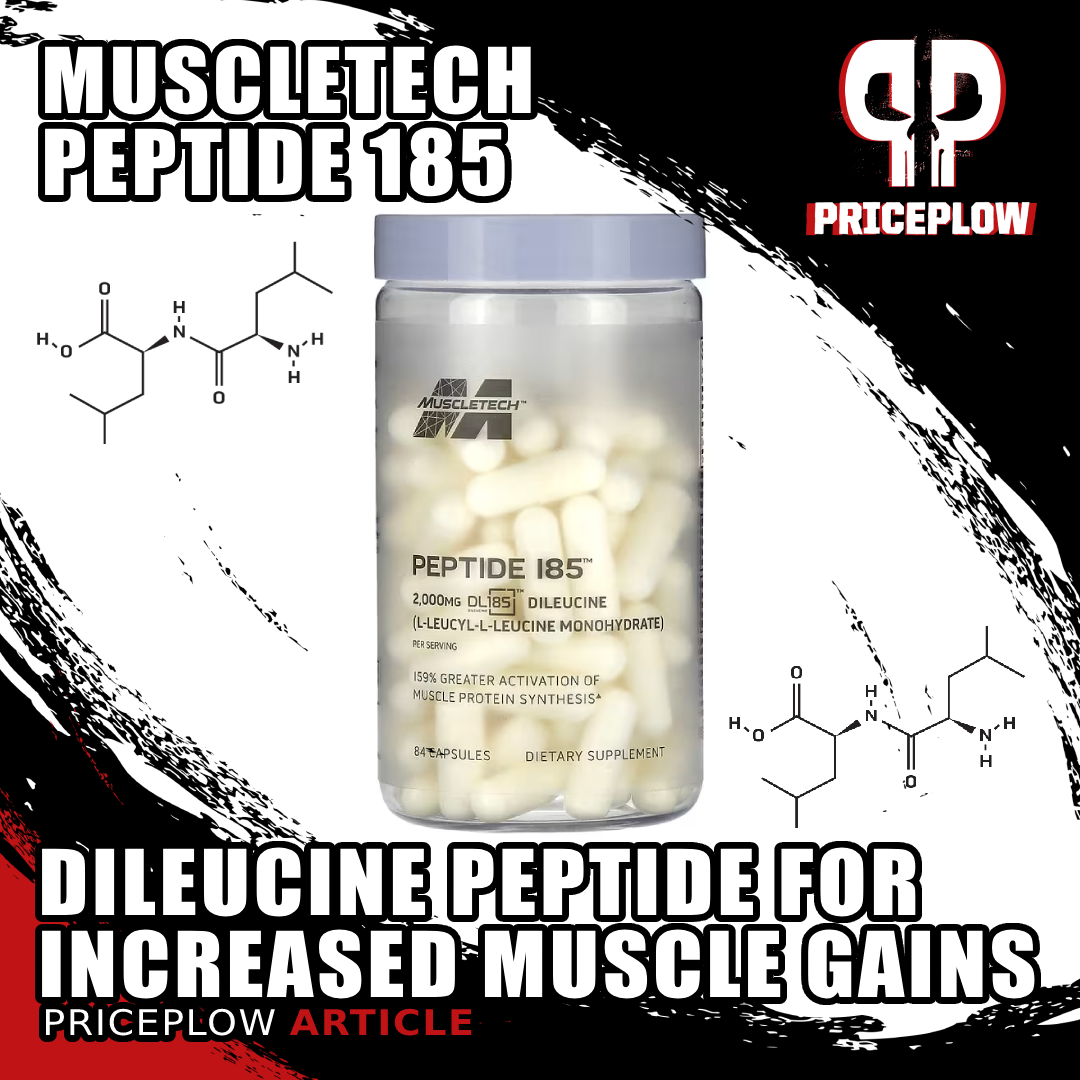
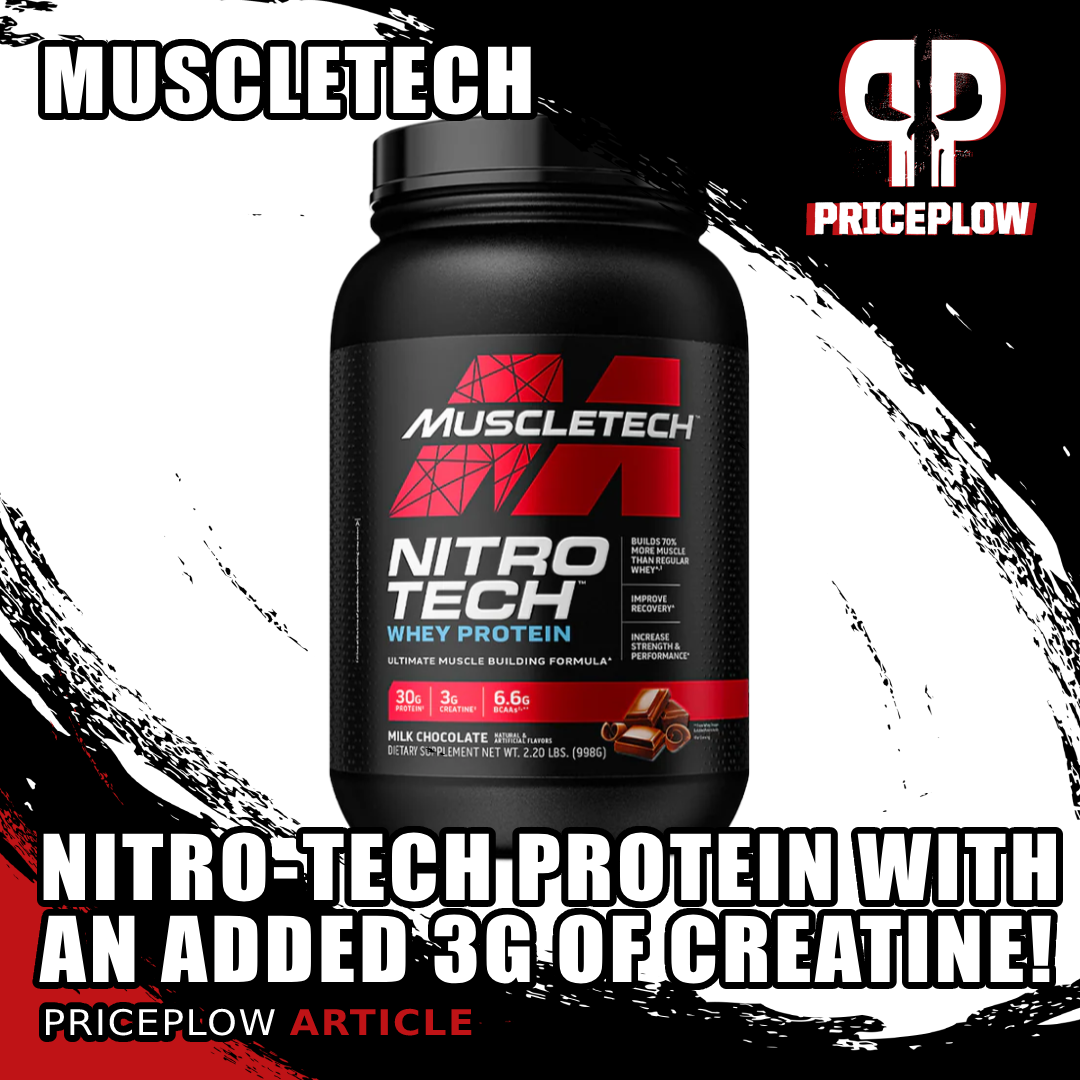
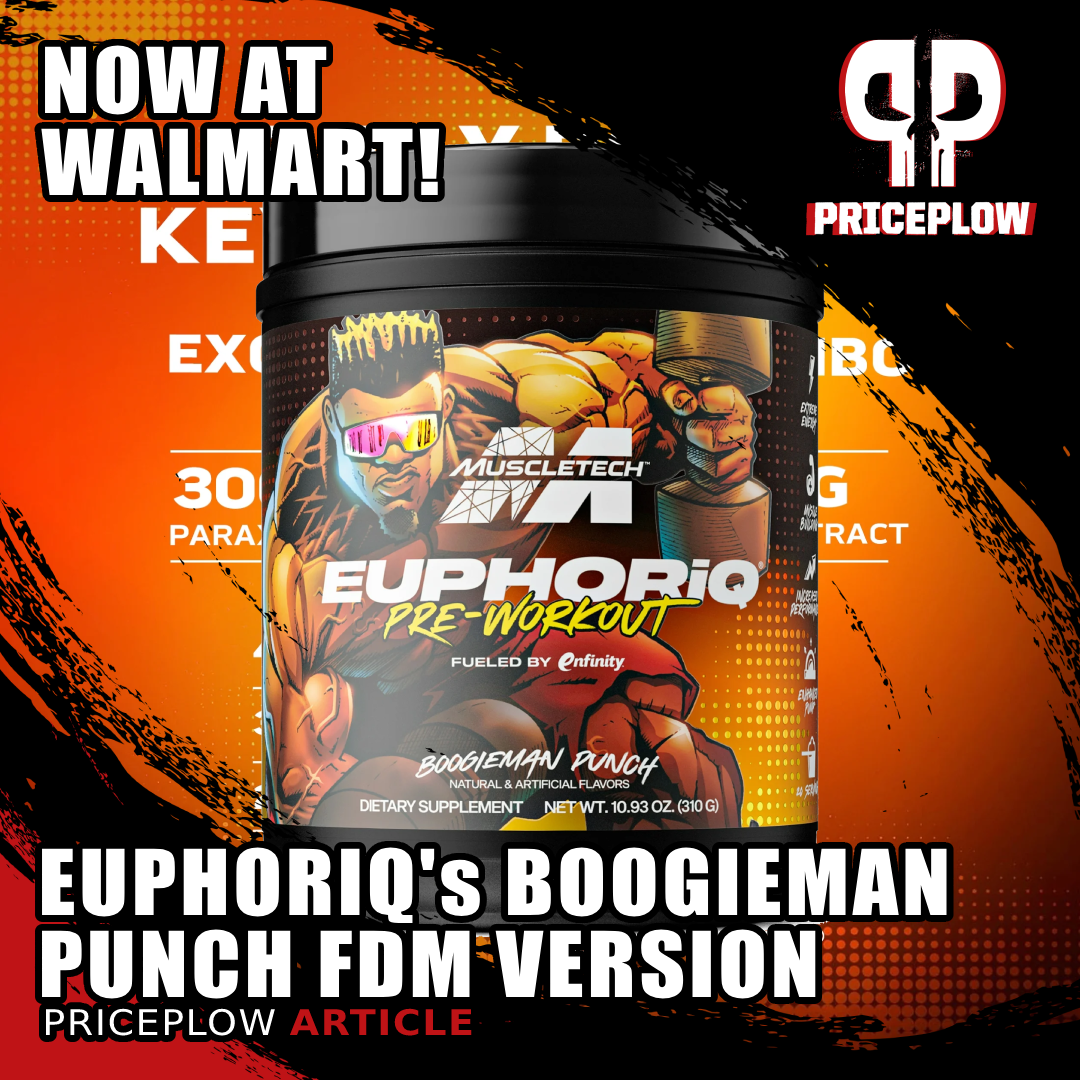
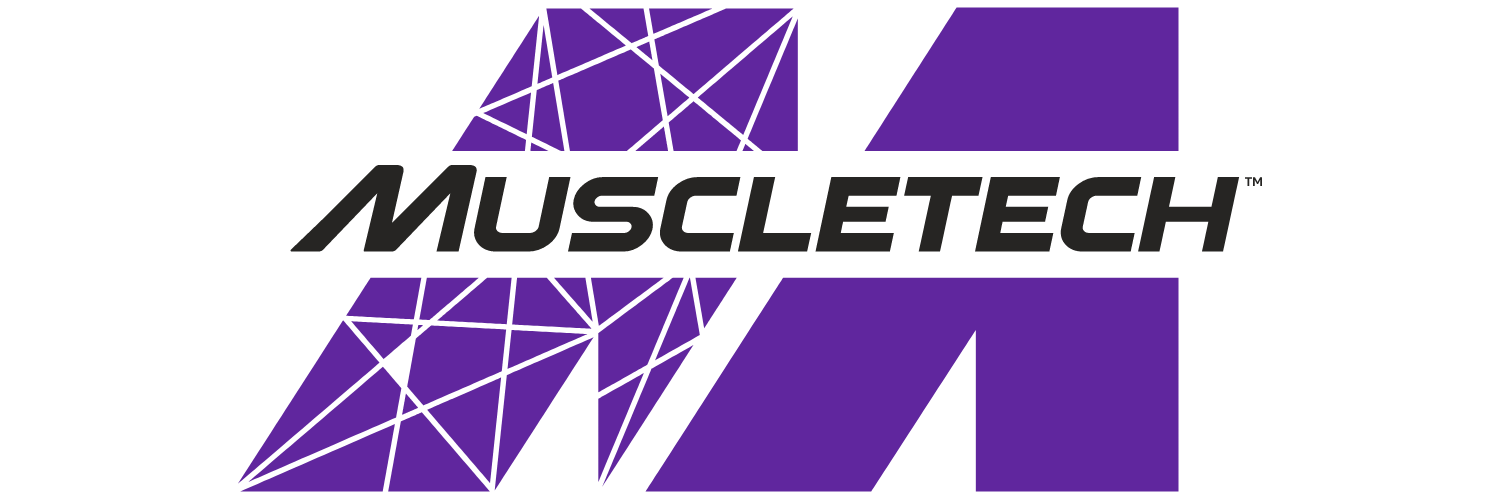
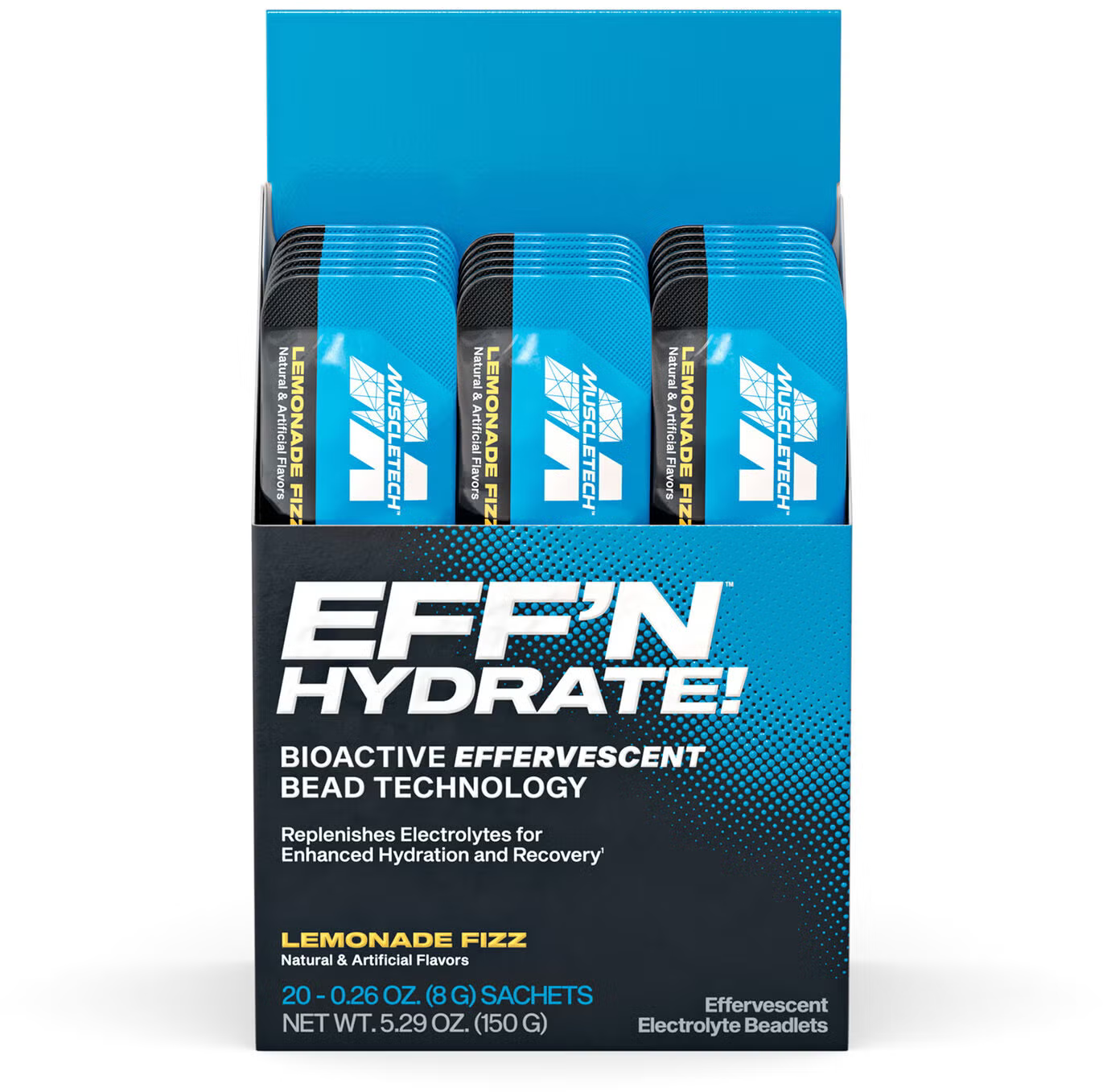
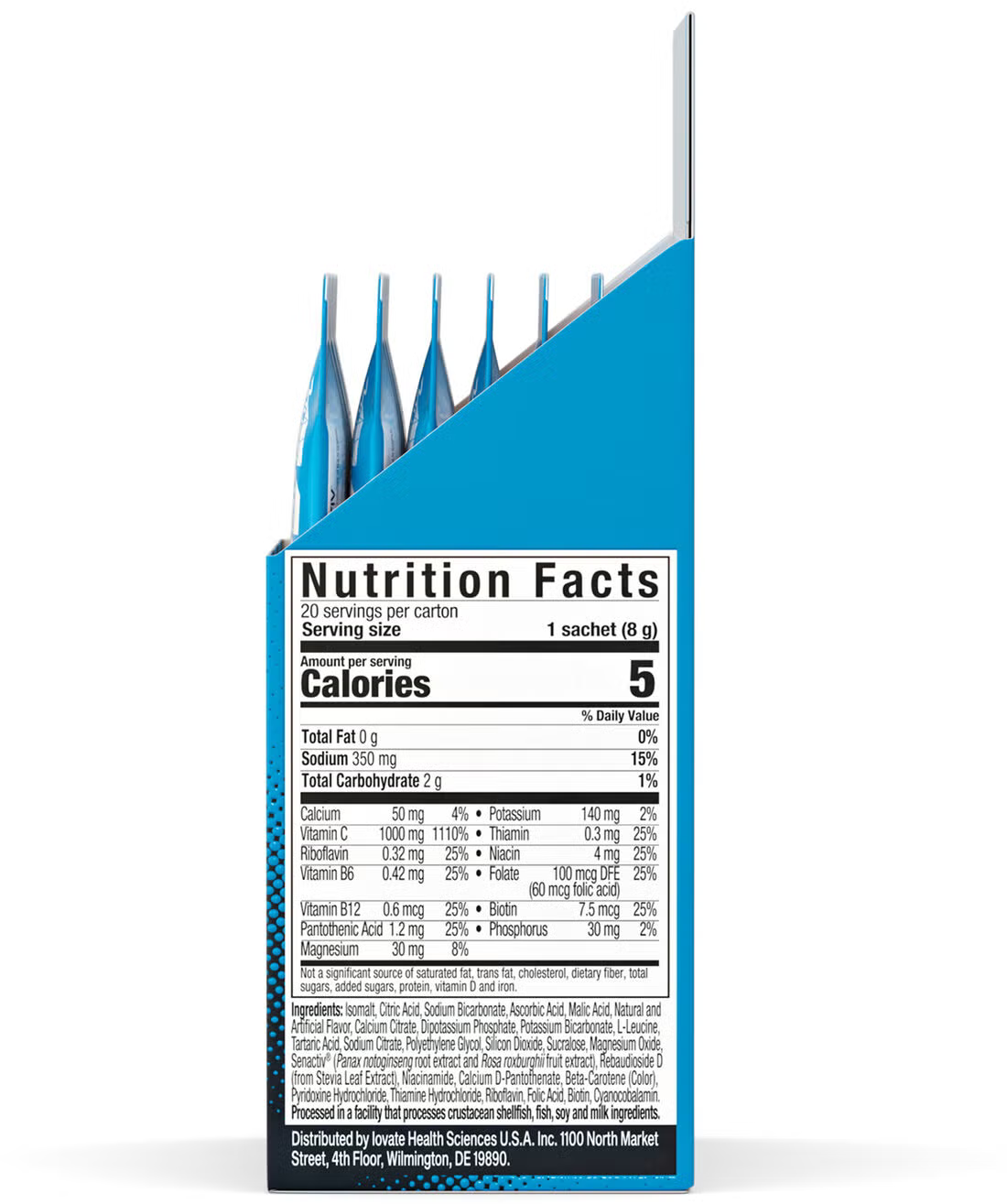
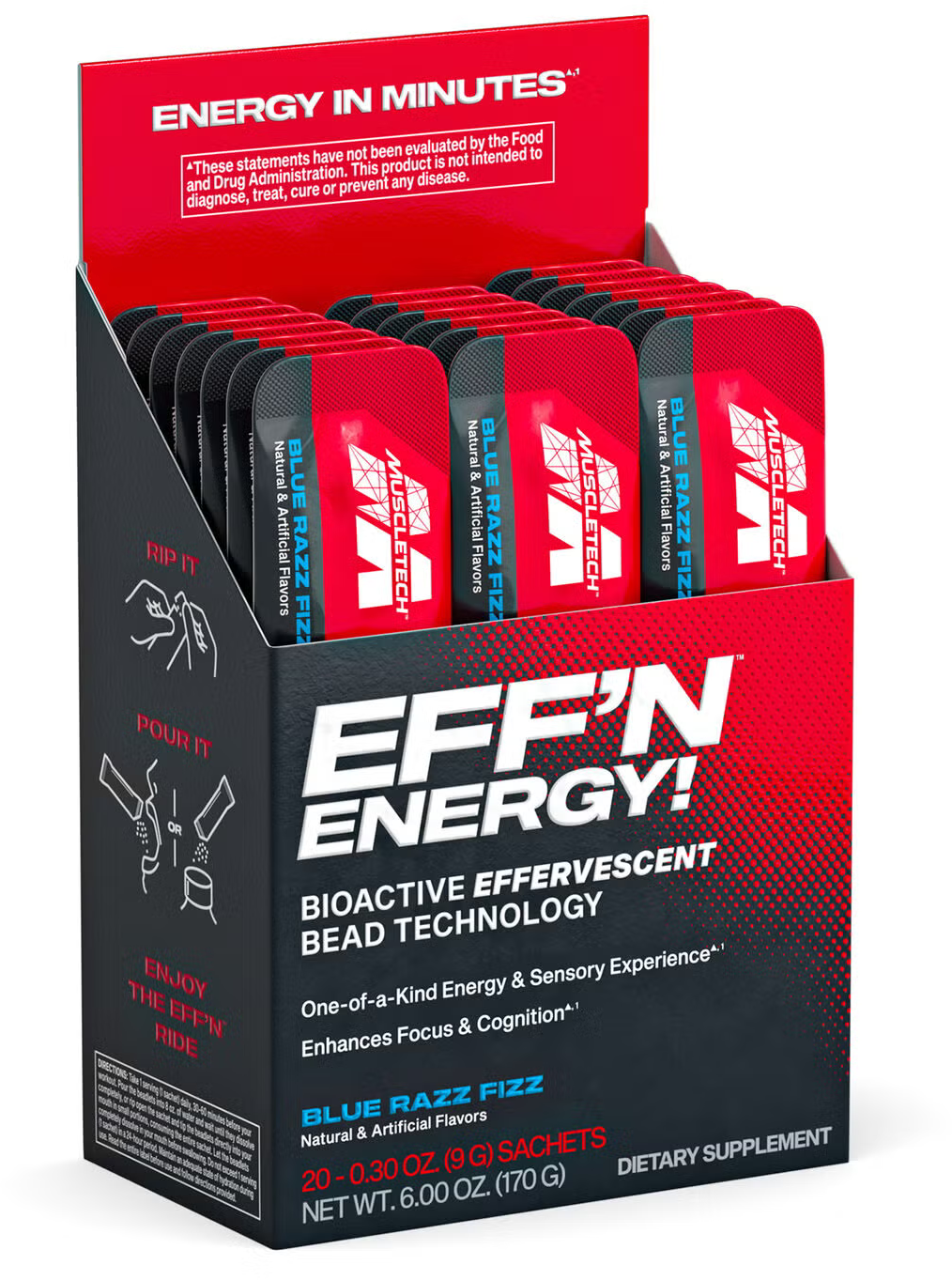
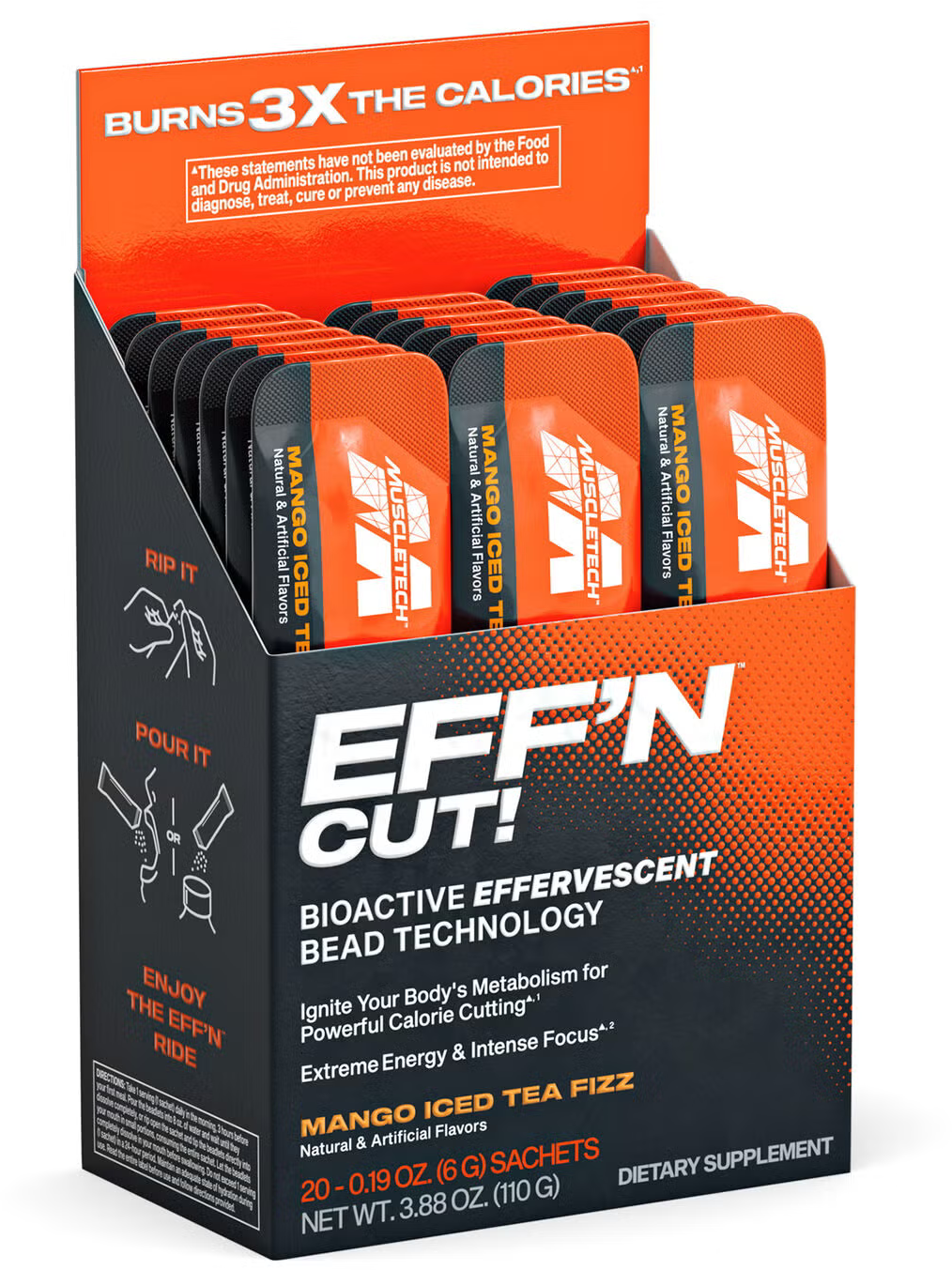
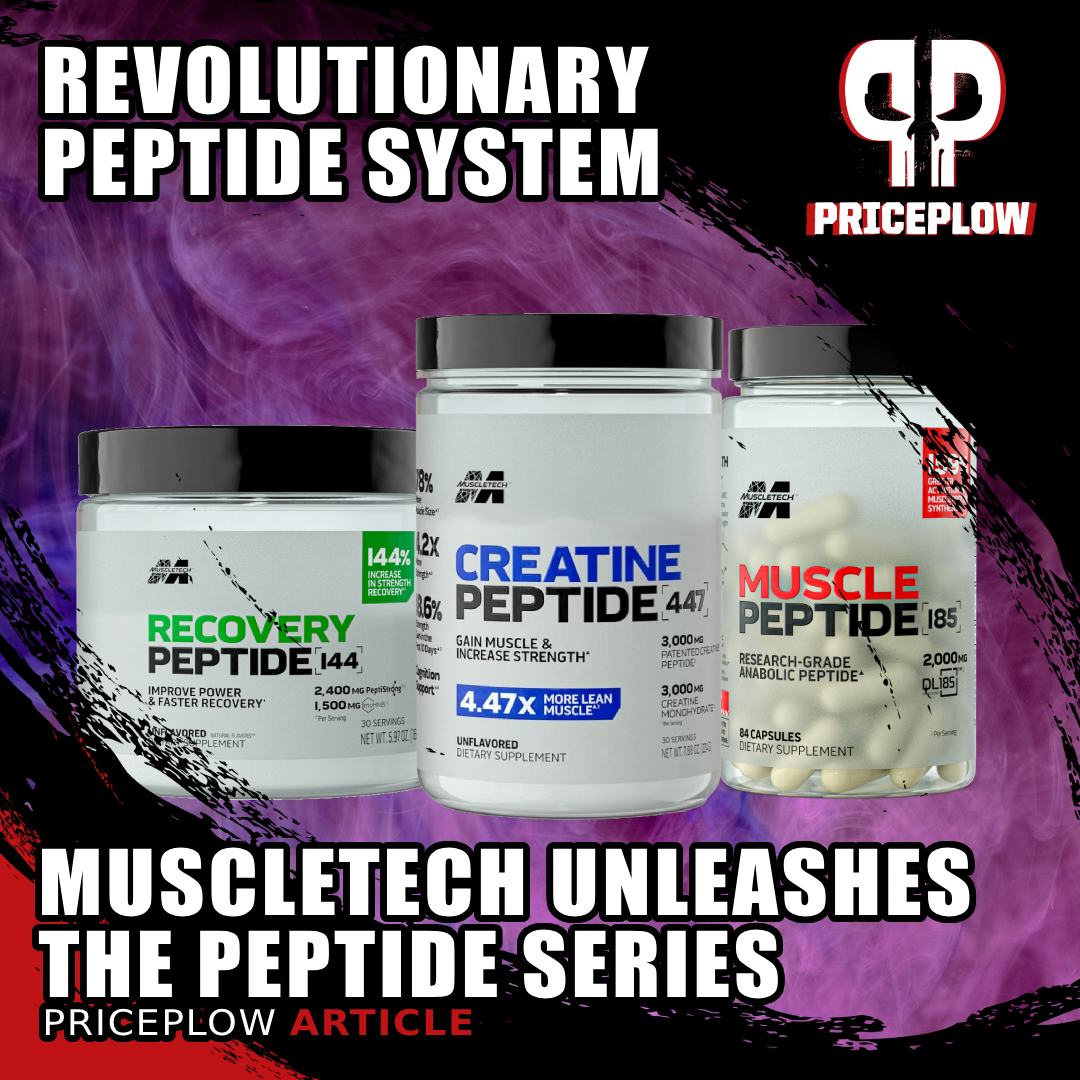
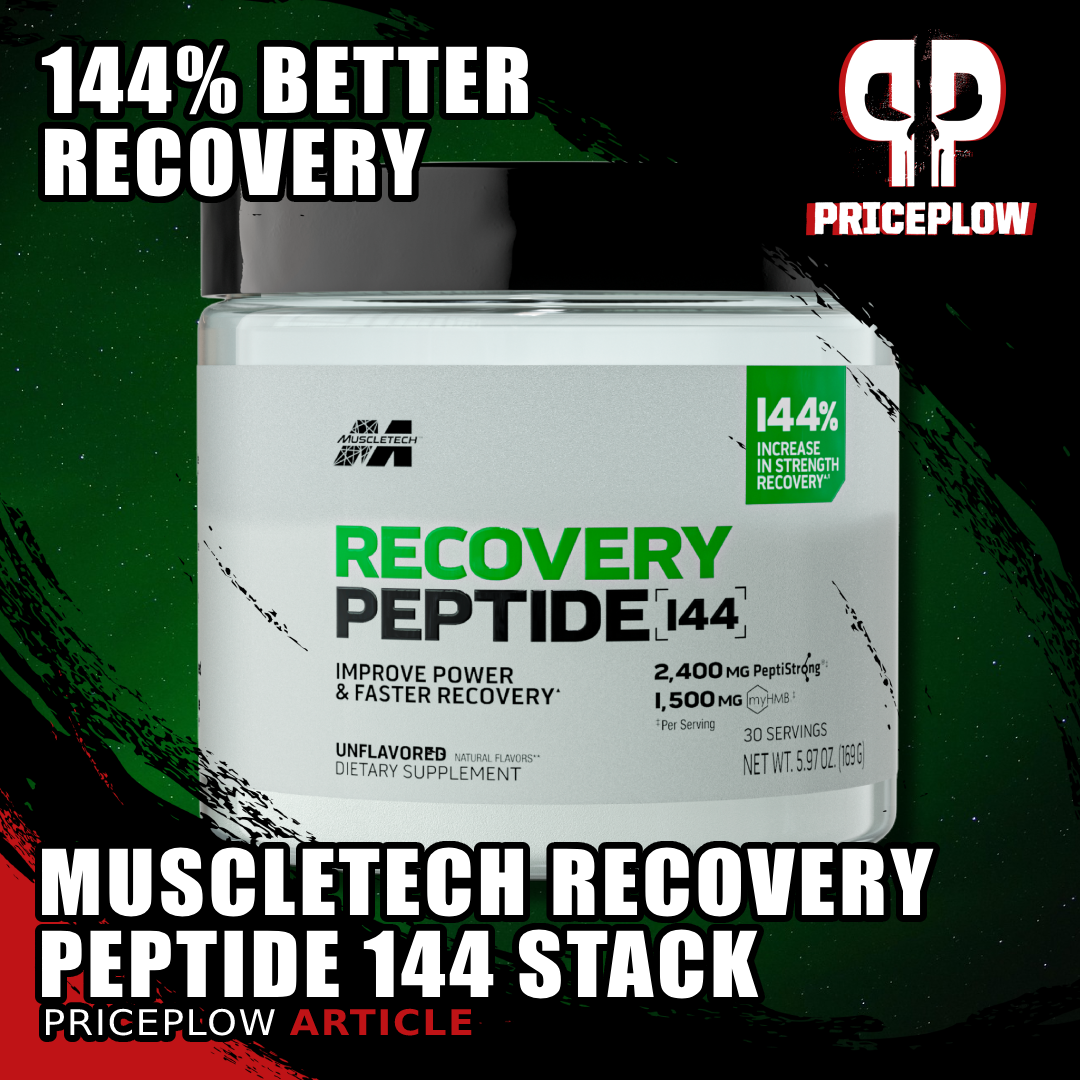
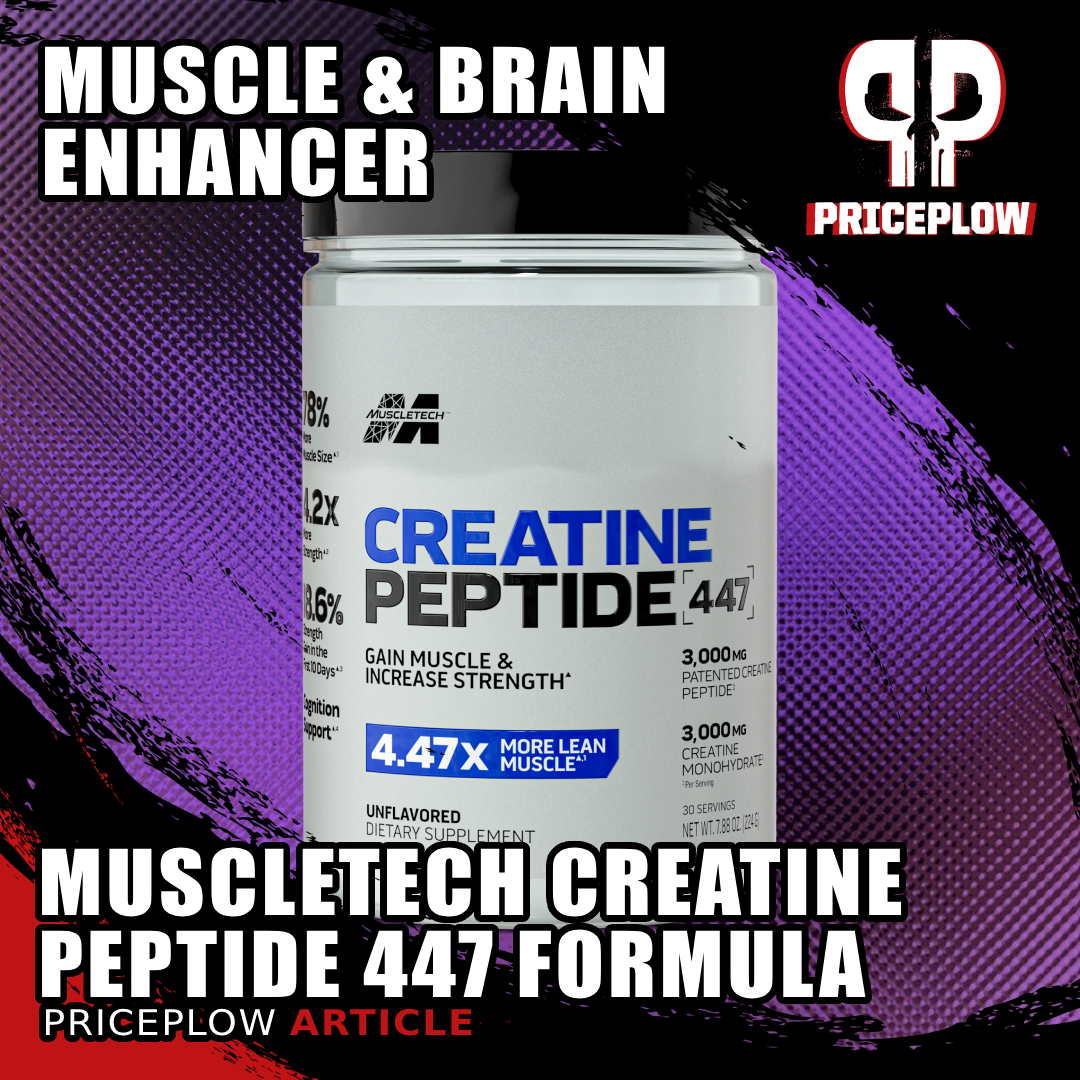
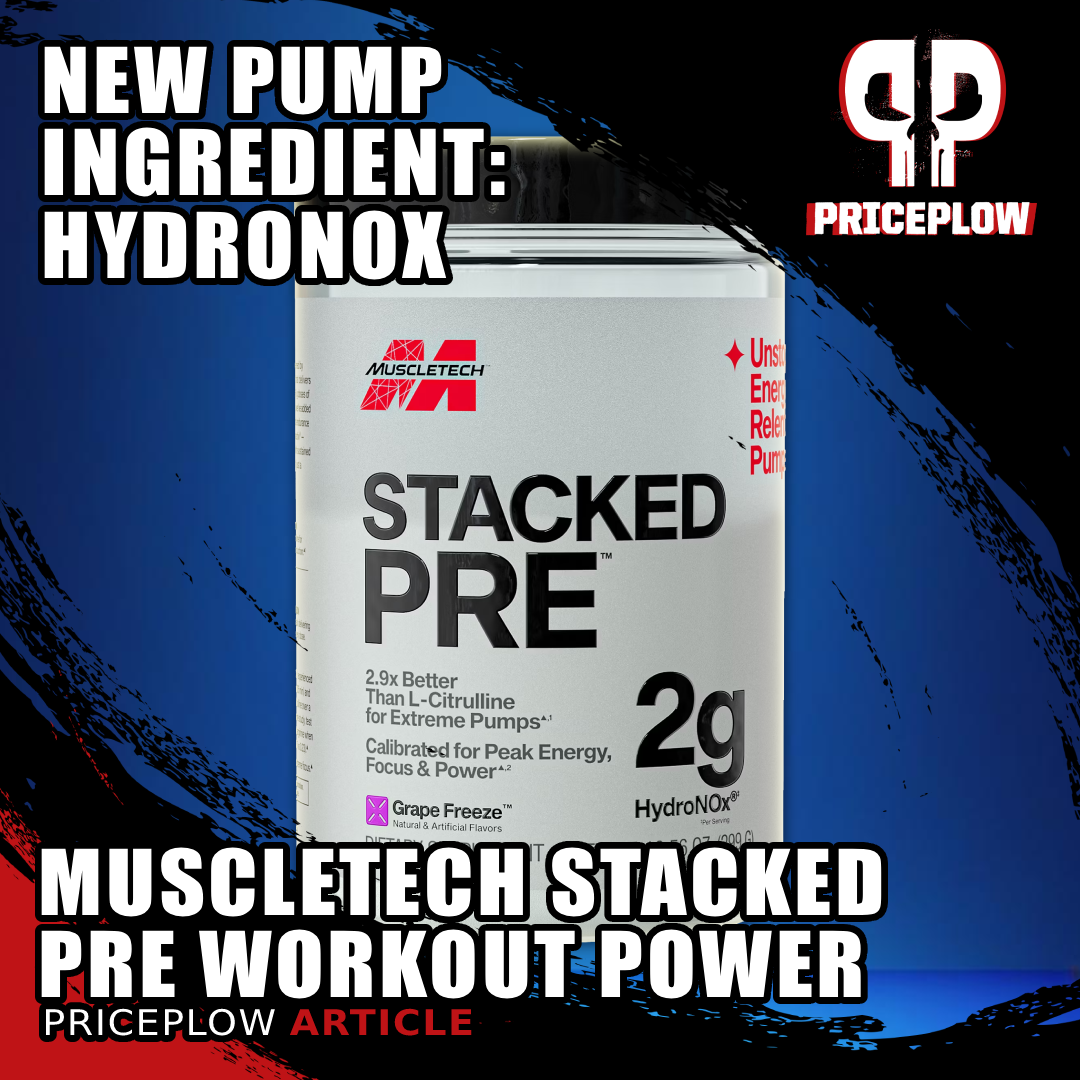
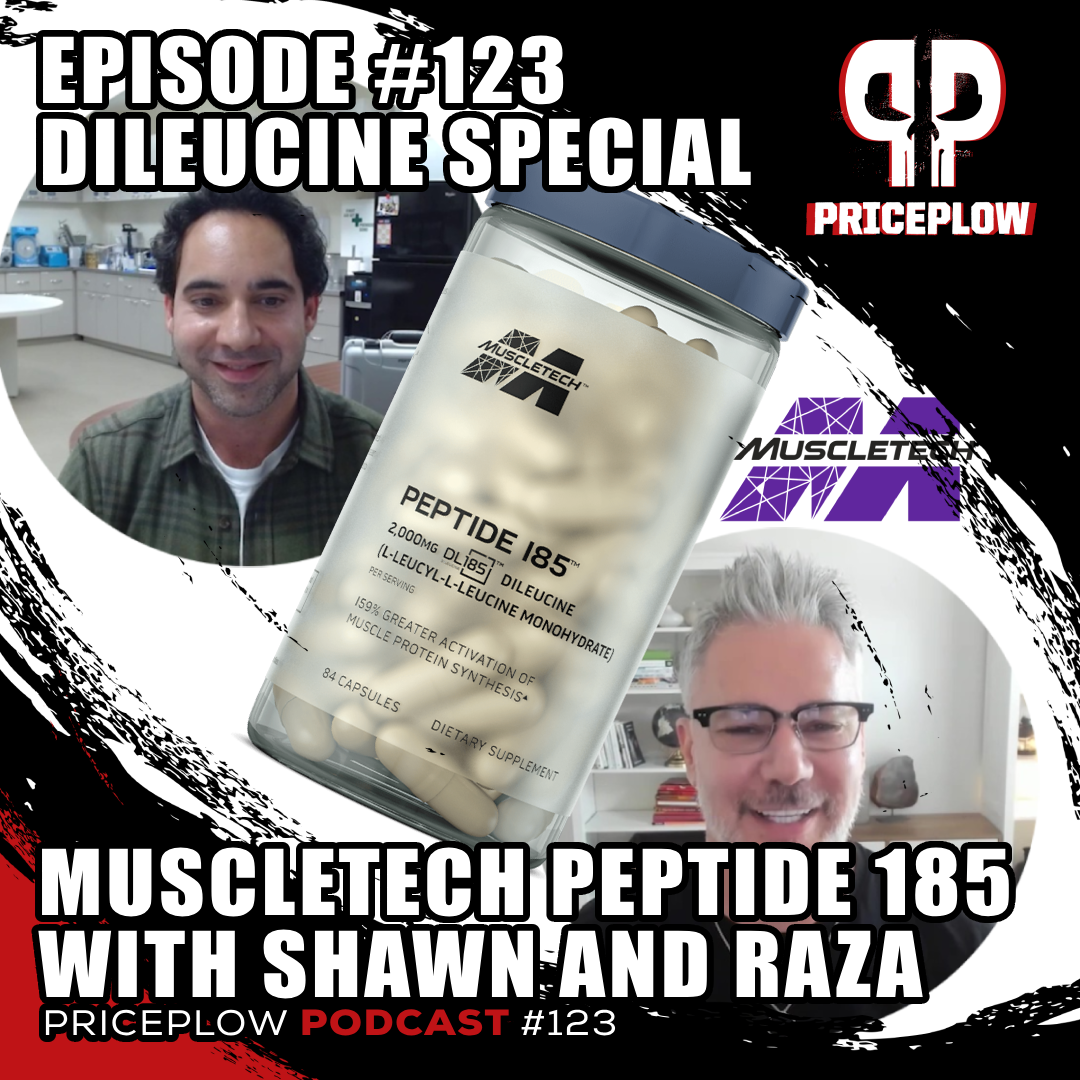
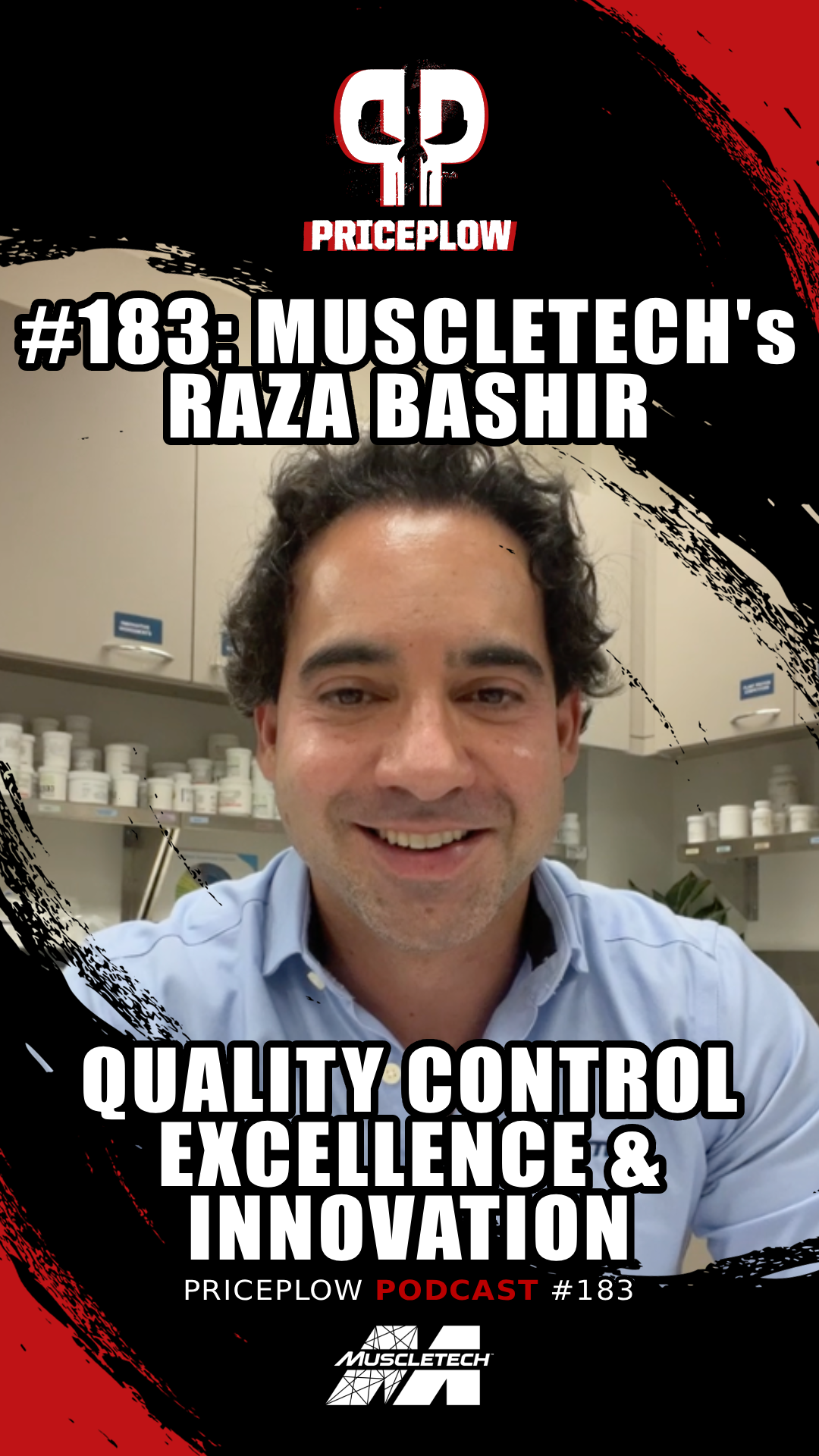


Comments and Discussion (Powered by the PricePlow Forum)